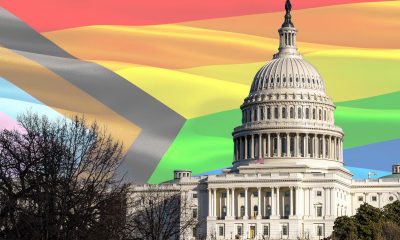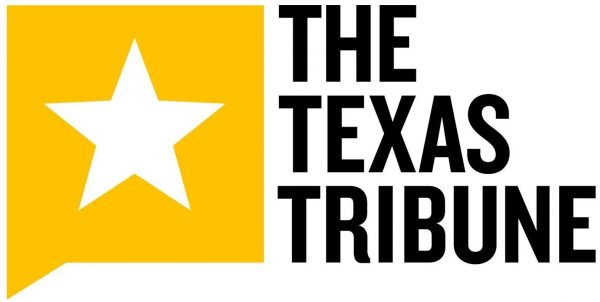Features
Mayor London Breed tackles hate crimes in San Francisco
The sudden spike of all hate crimes inspired Breed to create a street violence intervention program to respond to violence
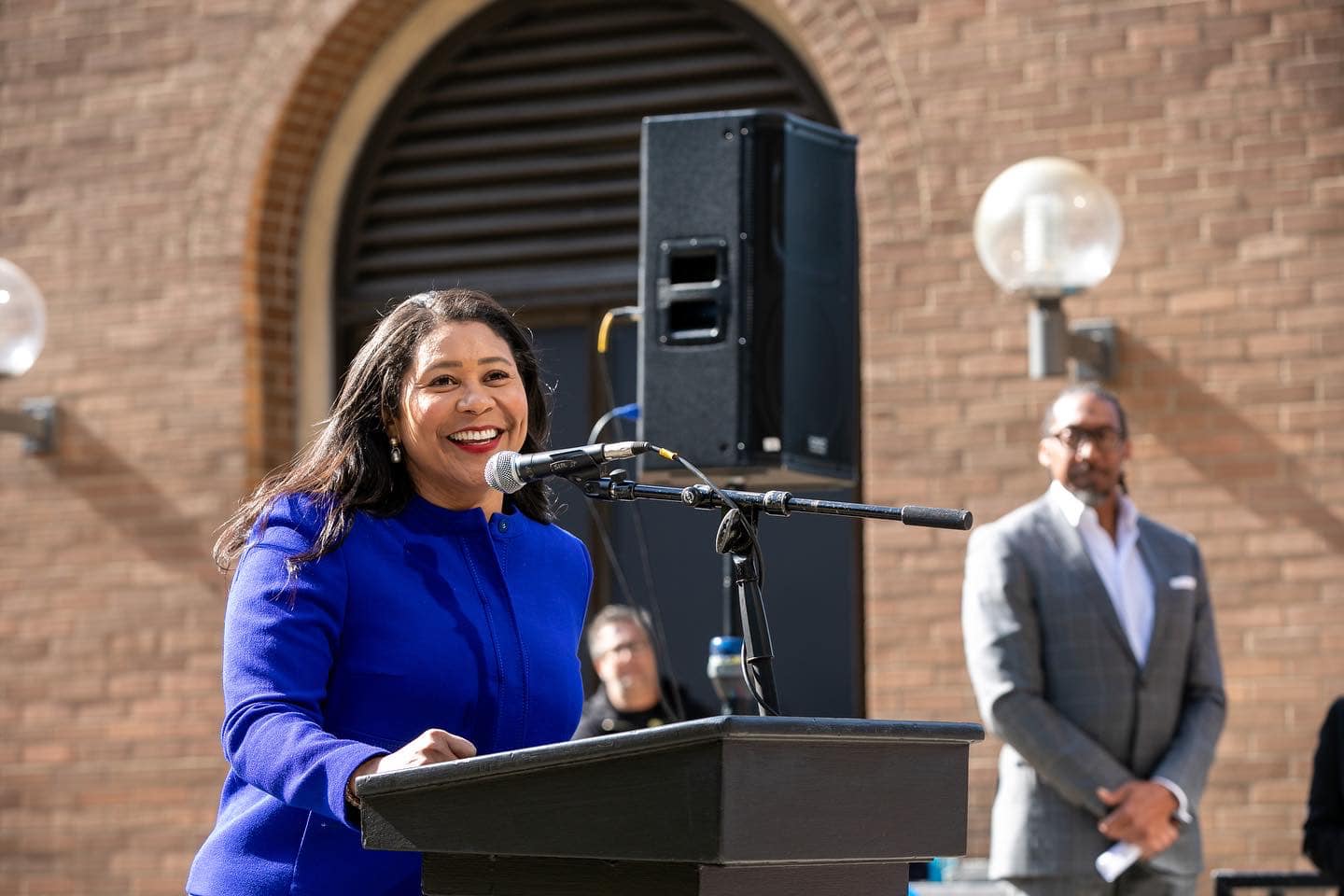
SAN FRANCISCO – Mayor London Breed has invested a large amount of financial resources and support in fighting hate crimes in the City by the Bay.
In 2021, hate crimes against Asians represented 53% of all hate crimes. The sudden spike inspired Breed to create a street violence intervention program to respond to violence, including shootings. Responders act quickly to not only aid the victims and their families but also to help prevent retaliation which might then lead to a never ending cycle of violence.
Breed also partnered with the Community Youth Center to help train and cultivate young Asian people by providing job opportunities and leadership opportunities and helping support one another within the community. She also created a senior escort program to provide seniors with help getting home safely and running errands.
“We are going to support the community,” Breed told The Blade explaining her mission. “We are going to band together against anyone, no matter what their race is, when they attack. We are going to bring Black and Asian communities together to create solidarity and support and to address public safety in the community. Most importantly, we are going to implement restorative justice by getting to the heart of people, trying to understand why these people are committing these crimes, and how to address it and prevent it in the future.”
Already, Breed’s programs and initiatives have produced positive change. According to a study shared with The Blade by the Mayor’s office, In 2022, hate crime cases went down significantly (68%) when compared to 2021. Hate crimes went up 81% in 2021 when compared to the average for the previous three years (2018-2020). Hate crimes against AAPI people contributed to this increase. In 2022, the number of hate crimes against the AAPI community went down tenfold compared to 2021(from 60 to 6 cases)
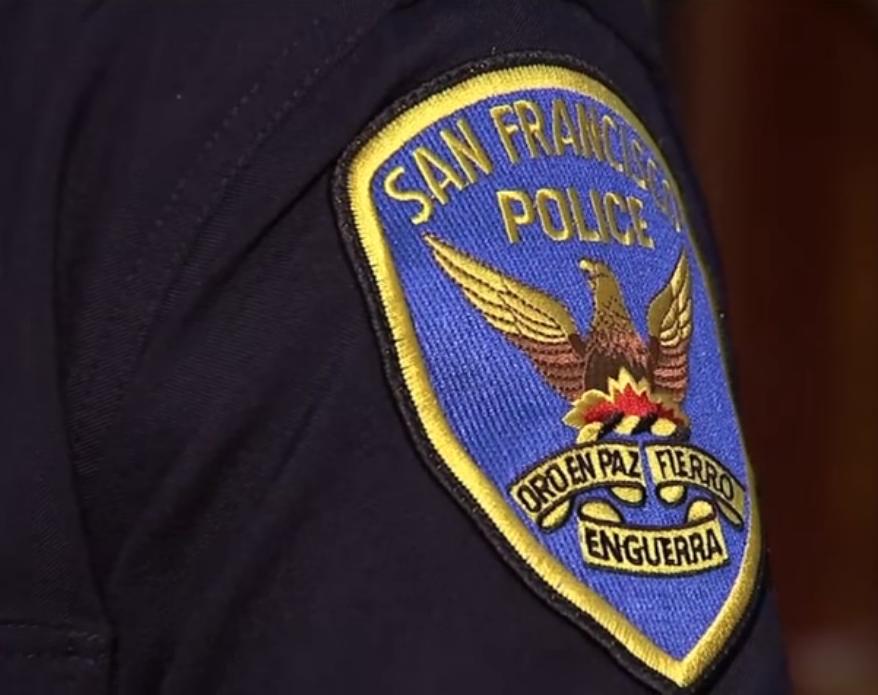
Unfortunately, hate crimes against LGBTQ+ individuals are high as a proportion of all cases (including gay males, trans individuals, and lesbians). In 2022, 28% of hate crimes targeted LGBTQ+ individuals.
On average, 22% of recorded hate crimes in the last five years (2018-2022) targeted LGBTQ+ individuals.
The Mayor’s office also shared the following list of efforts to tackle hate crimes in San Francisco:
Examples of main efforts to tackle hate crimes in San Francisco
- Creation of the SFPD Community Liaison Unit to focus on hate crimes and incidents. The unit, comprised of five dedicated officers from the SFPD’s Community Engagement Division, has been supporting San Francisco’s diverse communities, improving reporting of crime, and supporting victims of hate crimes and prejudice-based incidents.
- San Francisco contributed over $3 million in the last two budget cycles to supporting the creation of the Coalition for Community Safety and Justice (CCSJ). This Coalition, formed in response to long-standing incidents of violence, crime, racial tensions, and the surge in COVID-19 related anti-Asian racism, was founded by five Asian organizations which work to identify and develop community-centered programmatic solutions to mitigate violence and hate across all communities of color.
- The City allocated over $400,000 in the FY 22-23 budget to expand trauma recovery services for Cantonese speaking victims of crime.
- Expansion of the Street Violence Intervention Program (SVIP) to dense neighborhood commercial corridors with a high volume of Asian pedestrian traffic.
- Over $1 million investments for transgender violence prevention and community services for Black, Latinx, and transgender communities of color and re-entry services for transgender community members, and case management for formerly incarcerated transgender residents.
- LYRIC Center for LGBTQ Youth and the Office of Transgender Initiatives started convening local LGBTQ+ organizations to work on initiatives to tackle LGBTQ hate, including digital harassment and threats of physical violence.
GROWING UP WITH VIOLENCE
Breed is the 45th Mayor of San Francisco and the first African-American woman elected to the position, previously having served as president of the Board of Supervisors from 2015-2018. She is well known for her immediate and effective response to COVID-19 as well as her devotion to helping underprivileged youth, ending homelessness, advancing public safety, and advocating for the Asian, Black, and LGBTQ+ communities’
In Breed’s childhood San Francisco community, violence and fear were a way of life.
“People I grew up with had a lot of conflict with other people I grew up with like close family and friends,” Breed told The Blade, “so in that type of situation, there was a lot of fear. For example, with the African-American men in my family, my brothers, my cousins, my uncles, there was fear because of where you lived or whose family member might have killed or had beef with another family member. I grew up concerned about my community, concerned about someone dying. I went to sadly more funerals than I can count.”
Breed was raised in poverty primarily by her grandmother in a house of five, often taking random jobs like delivering elderly people’s groceries for one dollar per store run to scrape together some extra cash.
As Breed got older, she began to take an active role in bettering her community and advocating for those in similar underprivileged states. For a long time, financing the type of change she was trying to implement proved to be her biggest challenge.
“As a community advocate and someone who worked with young people to help address these types of challenges, it was a constant battle to get resources to invest in the kind of programs that would help turn people’s lives around.”
The Mayor has come a long way from her early struggles to finance programs as she recently signed a $14 billion dollar budget that prioritizes economic recovery, public safety, workers and families, homelessness, and behavioral health needs.
Breed also told The Blade that her experience growing up surrounded by fear is what inspired her to become a politician.
“When I first ran for the Board of Supervisors, I did it unfortunately because there was a lot of violence in my community,” said Breed. “So, there was a lot of need to not only help prevent violence but to respond to it. I really felt like there was a voice needed at City Hall that actually understood what it was like to live in that situation every single day, and in some cases to live in fear because of the issues around gun violence. A big reason why I ran was wanting to do better for my community.”
HATE SPEECH AND PREJUDICE
As a woman of color and the first Black woman to be elected to her position, Breed has faced a backlash of racism, threats, and discrimination throughout her career.
“When I got into the political arena, that is when sadly a lot of the real nastiness started to take shape –the name calling, the threats, the various kind of attacks on me based on being either a woman or because of my race,” Breed said.
Some of these attacks even escalated to protests in front of her residence.
“I do remember someone with a pitchfork,” recalled Breed, “like a real pitchfork outside, and some of the language used like ‘tar feather.'”
The expression to Tar and feather a person is an expression that alludes to a former brutal punishment in which a person was smeared with tar and covered with feathers. It is a form of public humiliation that has been used for centuries to take revenge or to punish someone. It was used during the American Revolution and throughout American history to harm people with certain political or religious beliefs.
Scarily, these types of ignorant attacks have even come from well-educated and respected individuals in the community Breed said.
“I just remember this one individual who worked for one of the lawyer’s groups, I forget which one it is, he went on this rampage and basically called me a coon. He was a white man who worked with lawyers to address civil rights-related issues, and yet this was the kind of language that he used at me.
It is unfortunate that it gets to that point, but sadly when you are an elected official, that is something you have to be prepared for, even though it’s still hurtful when it happens,” she noted.
The word Coon is an extremely disparaging and offensive contemptuous term used to refer to a Black person. The use of this term as an ethnic slur derives from the practice of using coonhounds (dogs trained to hunt raccoons) to recapture escaped black slaves prior to the end of the Civil War and later adopted by extremist white supremacist groups such as the Ku Klux Klan, intolerant individuals or other groups.
Selflessly, in these moments, Breed said she feared more for the well-being of her community than for her own personal safety.
“I kind of feared more what would happen if people from my community decided to respond to these kinds of attacks, which they also took offense to, or what would happen if the police responded. I was always more so concerned about someone getting hurt or some sort of altercation or anything that could happen as a result of a lot of this hate speech.”
When asked why this type of bigotry is still so common, Breed said she believes there are a number of reasons, listing mental illness and lack of proper education both in schools and in homes.
“I was fortunate to grow up in a household with a grandmother who made me feel that I needed to treat everybody right,” said Breed. “That stemmed from her growing up in Jim Crow south with segregation just one generation removed from slavery and how she felt the way she was treated was wrong. That was really embedded in me.”
“I think that if you have the kind of people in your life who make you understand from day one that that type of thinking is wrong, it makes a difference.”
“Also, we need to think about what we are teaching in our schools. Are we teaching kids as they come up how to treat one another? Are we teaching ethical behavior? I just think that to a certain extent, we have gotten away from all that.”
Breed also shared her desire for other social change, mainly in the way schools are addressing gendered bathrooms, as she feels this debate is emblematic of the same lack of empathy that leads to hate speech and hate crimes.
“I would like to see a change, for example, in this whole debate around bathrooms and the, ‘I don’t want my kids in the bathroom with this other person’ perspective. Why is this made into such a big deal? Why can’t we figure out a better way to allow people to grow up in a society where there is no stigma attached to who uses the restroom based on what they feel their gender is? How do we change that? How do we maybe change the bathroom options that we have? How do we naturally create as kids grow up more of a congregant society around that? And I think we have to think about how there are different kids with different experiences, and we need to learn how to be respectful of one another and not feel like we deserve something more than someone else. Everyone deserves to have the right to use the restroom based on the restroom of their choosing, and how we address that is by making sure that we make it a part of what we do in our public schools and our school systems in general.”
When asked for her opinion on why online hate speech can turn to violent hate crime, much like with the recent Club Q shooting, Breed said she believed some people might take cyber hate speech as a call to action.
“I do think we have a responsibility to be very careful about what we put out there because it definitely can imply that you were asking people to go after someone because of their stance on their race, gender, or their political stance.”
“I just think that social media has really damaged our society,” said Breed. “I remember when the kids at the Cultural Center started using Myspace. At first, the kids were on Myspace, and they were just showing pictures of each other and talking about each other, and saying nice things like telling each other they looked nice. I thought this was kind of a cool thing, and then all of a sudden, it became a tool that the kids started using to figure out people’s whereabouts. Then people started attacking one another to the point where all of a sudden, there were shootings between communities because of battles on social media. It went from being what was meant to be this positive way of communicating and staying in touch with one another to being used as a tool to push for fights and violence.”
“I do think we have a responsibility to monitor social media to the best of our ability. If we are a company responsible for the platform, we need to ensure that when we see something getting out of hand, we are dealing with it. Because when you are on the computer typing, you are not looking at a person face-to-face. You are talking to a computer, and you may have all these things on your mind that you want to get out, but then that information goes to the public to a whole other arena and kind of takes on a life of its own. For some people, that’s empowering, and they feel like people are finally paying attention to them when they weren’t before. And then they continue to push the envelope. So I really think it can be very dangerous, and I do think we have a responsibility to provide a lot more regulation, especially around hate speech.”
Of all the social media platforms, Breed takes the most issue with San Francisco-based Twitter, which has become increasingly controversial and toxic since billionaire Elon Musk’s takeover of the company.
“Twitter is pretty horrible. It’s toxic, and it’s sad because, again, a tool that should be used for good has turned into just a place where it is really all about attacking somebody and coming up with the most creative or clever way to go after somebody. I really think Twitter is the most dangerous of them all. I just would like to see it become more responsible,” she said.
“I do think that when the rise of hate crimes elevates to violence, there have to be consequences. People need to be prosecuted to the fullest extent of the law,” Breed added.
POSITIVE CHANGE
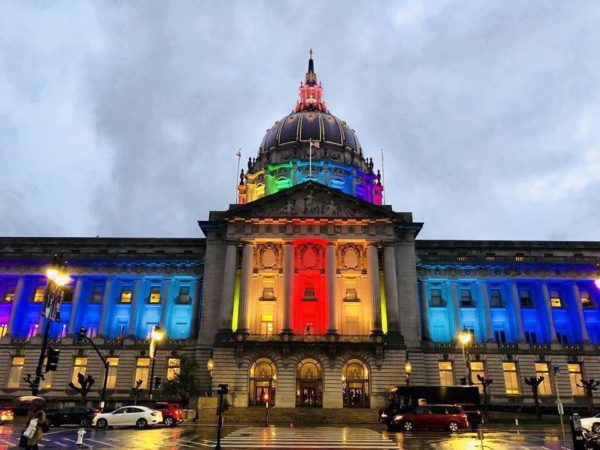
(Photo courtesy of Western Business Alliance)
“Stay true to who you are. Do good work in the community, and feel good about what you are doing.”
When asked about her most proud accomplishment thus far in elected office, the mayor named her Opportunities for All (OFA), program which provides paid internships for high school students in the city.
“No matter what school you go to, no matter where you live, we will not turn any kid away. Even if we don’t have a place to fit them, we will still make sure they have some sort of paid opportunity for the summer so that no one gets left out. I never want money to be a barrier to someone’s desire to be successful in their life.”
“When I was 14, I was able to get a work permit and be part of the Mayor’s Youth Employment and Training program,” said Breed. “The problem with that was there were only so many spaces.”
While Breed was able to secure a spot in the program, seeing what happened to some of her peers as a result of the program’s limited space deeply affected her.
“I remember a whole lot of people not getting a space in the program, and all I could think about were some of the kids who I went to school with who went from being not so bad to being actually really terrible. They were involved in a lot of drug dealing in violent crime. I just felt like there was a really critical moment where I realized that if we were not going to send these people on the right path, they were going to go in a very different direction. I just want to make sure we never miss out on an opportunity to turn someone’s life around.”
Thanks to her policy of never turning any child away from OFA, Breed is able to boast of the program’s positive impact on San Francisco’s youth. Some participants in the program have learned valuable skills like leadership and coding. Some now work for nonprofits, tech companies, and city government, to name a few. Many go off to college and return to help manage and run the program for other youths.
“I feel like this program is really going to, and has already transformed lives, and will continue to do so,” said Breed.
Finally, she shared some words of encouragement for future leaders:
“I would say to any young person looking to become a leader, one day, number one, just believe in yourself. You know what’s in your heart. Stay true to who you are. Do good work in the community, and feel good about what you are doing. When opportunities present themselves, don’t be afraid to take advantage of them. Sometimes it can feel scary and overwhelming, but at the end of the day, if you feel it in your heart and you want to go for it, I say go for it.”
Features
Tristan Schukraft speaks on keeping queer spaces thriving
The new owner of the Abbey continues to expand to protect queer spaces

Like the chatter about Willy Wonka and his Chocolate Factory, the WeHo community started to whisper about the man who was going to be taking over the world-famous Abbey, a landmark and part of history in Los Angeles’ queer nightlife. Rumors were put to rest when it was announced that entrepreneur Tristan Schukraft would be taking over the legacy created by Abbey founder David Cooley. All eyes are on him.
For those of us who were there for the re-opening of The Abbey, when the torch was officially passed, all qualms about the new regime went away as it was clear the club was in good hands and that the spirit behind the Abbey would forge on. Cher, Ricky Martin, Bianca del Rio, Jean Smart, and many other celebrities rubbed shoulders with veteran patrons, and the evening was magical and a throwback to the nightclub atmosphere pre-COVID.
The much-talked-about purchase of the Abbey was just the beginning for Schukraft. It was also announced that this business impresario was set to purchase the commercial district of Fire Island, as well as projects launching in Mexico and Puerto Rico. What was he up to? Tristan sat down with us to chat about it all.
“We’re at a time right now when the last generation of LGBT entrepreneurs and founders are all in their sixties and they’re retiring. And if somebody doesn’t come in and buy these places, we’re going to lose our queer spaces.”
Tristan wasn’t looking for more projects, but he recounts what happened in Puerto Rico. The Atlantic Beach Hotel was the gay destination spot and the place to party on Sundays, facing the gay beach. A new owner came in and made it a straight hotel, effectively taking away a place of fellowship and history for the queer community. Thankfully, the property is gay again, now branded as the Tryst and part of Schukraft’s portfolio with locations in Puerto Vallarta and Fire Island.
“If that happens with the Abbey and West Hollywood, it’s like Bloomingdale’s in a mall. It’s kind of like a domino effect. So that’s really what it is all about for me at this point. It has become a passion project, and I think now more than ever, it’s really important.”
Tristan is fortifying spaces for the queer community at a time when the current administration is trying to silence the LGBTQ+ community. The timing is not lost on him.
“I thought my mission was important before, and in the last couple of months, it’s become even more important. I don’t know why there’s this effort to erase us from public life, but we’ve always been here. We’re going to continue to be here, and it brings even more energy and motivation for me to make sure the spaces that I have now and even additional venues are protected going in the future.”
The gay community is not always welcoming to fresh faces and new ideas. Schukraft’s takeover of the Abbey and Fire Island has not come without criticism. Who is this man, and how dare he create a monopoly? As Schukraft knows, there will always be mean girls ready to talk. In his eyes, if someone can come in and preserve and advance spaces for the queer community, why would we oppose that?
“I think the community should be really appreciative. We, as a community, now, more than ever, should stand together in solidarity and not pick each other apart.”
As far as the Abbey is concerned, Schukraft is excited about the changes to come. Being a perfectionist, he wants everything to be aligned, clean, and streamlined. There will be changes made to the DJ and dance booth, making way for a long list of celebrity pop-ups and performances. But his promise to the community is that it will continue to be the place to be, a place for the community to come together, for at least another 33 years.
“We’re going to build on the Abbey’s rich heritage as not only a place to go at night and party but a place to go in the afternoon and have lunch. That’s what David Cooley did that no others did before, is he brought the gay bar outside, and I love that.”
Even with talk of a possible decline in West Hollywood’s nightlife, Schukraft maintains that though the industry may have its challenges, especially since COVID, the Abbey and nightlife will continue to thrive and grow.
“I’m really encouraged by all the new ownership in [nightlife] because we need another generation to continue on. I’d be more concerned if everybody was still in their sixties and not letting go.”
In his opinion, apps like Grindr have not killed nightlife.
“Sometimes you like to order out, and sometimes you like to go out, and sometimes you like to order in, right? There’s nothing that really replaces that real human interaction, and more importantly, as we know, a lot of times our family is our friends, they’re our adopted family.
Sometimes you meet them online, but you really meet them going out to bars and meeting like-minded people. At the Abbey, every now and then, there’s that person who’s kind of building up that courage to go inside and has no wingman, doesn’t have any gay friends. So it’s really important that these spaces are fun, to eat, drink, and party. But they’re really important for the next generation to find their true identity and their new family.”
There has also been criticism that West Hollywood has become elitist and not accessible to everyone in the community. Schukraft believes otherwise. West Hollywood is a varied part of queer nightlife as a whole.
“West Hollywood used to be the only gay neighborhood, and now you’ve got Silver Lake and you’ve got parts of Downtown, which is really good because L.A., is a huge place. It’s nice to have different neighborhoods, and each offers its own flavor and personality.”
Staunch in his belief in his many projects, he is not afraid to talk about hot topics in the community, especially as they pertain to the Abbey. As anyone who goes to the Abbey on a busy night can attest to, the crowd is very diverse and inclusive. Some in the community have started to complain that gay bars are no longer for the gay community, but are succumbing to our straight visitors.
Schukraft explains:
“We’re a victim of our own success. I think it’s great that we don’t need to hide in the dark shadows or in a hole-in-the-wall gay bar. I’m happy about the acceptance. I started Tryst Hotels, which is the first gay hotel. We’re not hetero-friendly, we’re not gay-friendly. We’re a gay hotel and everyone is welcome. I think as long as we don’t change our behavior or the environment in general at the Abbey, and if you want to party with us, the more than merrier.”
Schukraft’s message to the community?
“These are kind of dangerous times, right? The rights that we fought for are being taken away and are being challenged. We’re trying to be erased from public life. There could be mean girls, but we, as a community, need to stick together and unite, and make sure those protections and our identity aren’t erased. And even though you’re having a drink at a gay bar, and it seems insignificant, you’re supporting gay businesses and places for the next generation.”
Features
Drag Race’s Honey Davenport New Fashion Line Is Making A Statement
Introducing Honey’s Hose: The World’s FIRST Drag and Black Queer Owned Inclusive Hosiery Brand by RuPaul’s Drag Race Legend Honey Davenport
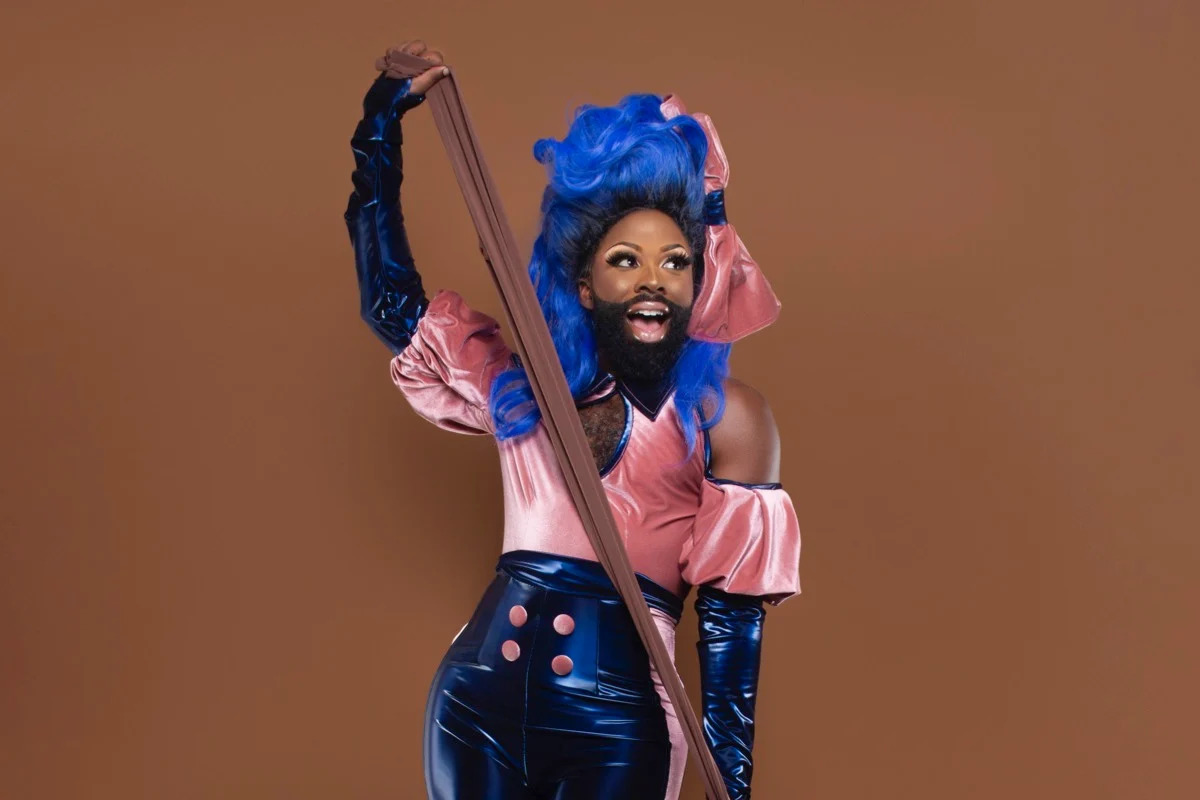
Powerhouse drag performer, musician, DJ, activist and Drag Race alum Honey Davenport can now add entrepreneur to her long list of titles. A proud member of the leather community and fierce advocate for the LGBTQ+ and BIPOC communities is combining art, sensuality and fashion with her debut business — Honey’s Hose.
Developed alongside her best friend Saul Williamson, Honey’s Hose offers a wide variety of high-quality hosiery specifically designed for all skin tones, body sizes and budgets. Their mission is to empower individuals through style, comfort and confidence, celebrating self-expression.
Honey’s Hose will also establish the Honey’s Heaux Artist Fund to help emerging drag artists, enabling them to access the perfect hosiery for their performances.
After spending time crowdfunding, attending business seminars and accelerator programs, the line officially launched this weekend with a huge drag queen bash in Palm Springs. We caught up with Honey in between celebrating to talk about her new venture, the power of sexuality, supporting the Black and drag communities and what the future has in store.
Why has it taken so long to get drag queens and diverse body sizes represented in the hosiery industry?
Honestly, it’s baffling. For decades, the hosiery industry has clung to a very narrow, outdated ideal of beauty. It’s a reflection of a larger societal problem – the constant marginalization of anyone who doesn’t fit the ‘norm.’ Drag queens, with their vibrant artistry and fearless self-expression, have always been at the forefront of challenging those norms. Bodies of all shapes and sizes deserve to be celebrated, not ignored. It’s about time the hosiery industry caught up with reality and recognized the beauty and power in our diversity. It’s not just about selling hose, it’s also about acknowledging and celebrating who we are.
Every day there seems to be more and more attacks on the queer and drag community. As a queer, Black business owner, how do you think we are going to get through these next few political years?
It’s terrifying. It’s exhausting. But, as a queer, Black business owner, I refuse to be silenced. Our strength lies in our community. We have to support each other, amplify each other’s voices and never stop fighting for our rights. We’ve faced adversity before and we’ll face it again. Resilience, creativity and unwavering love for who we are – that’s how we’ll get through this.
We have to continue to create visibility, celebrate our joy and show the world that we will not be erased. We will continue to build our chosen families and create safe spaces for our community.
How can we best support the drag community?
Show up!
Go to the shows, tip the queens and celebrate their artistry. Beyond that, support businesses that are vocal allies. Speak out against hate and discrimination. Educate yourself and others about the history and importance of drag. Most importantly, listen to the drag community. They know what they need and they deserve our respect and support.
How can the queer community best support the Black community?
Listen. Learn. Amplify. Educate yourself about the unique challenges faced by Black queer individuals. Support Black-owned businesses, including Black queer businesses. Show up for Black, queer events and other movements fighting for racial justice. Call out racism within the queer community. Remember that solidarity isn’t just a word, it’s a commitment to action.
What have been some of the biggest challenges in creating Honey’s Hose?
Where do I start? Sourcing inclusive sizing has been a huge hurdle. Manufacturers just weren’t equipped to handle the range we needed. Finding the right colors to truly represent diverse skin tones has been another challenge. And of course, navigating the business world as a queer, Black entrepreneur has its own set of obstacles. But every challenge has been worth it. Seeing the joy on someone’s face when they finally find hose that fit and celebrate their skin tone – that’s what keeps me going.
Do you come from a fashion design background, what was the creative process in putting the line together?
My background is actually in musical theatre and I have mostly just excelled at being fabulous, though I’ve always had a passion for self-expression through fashion. Creating Honey’s Hose, was a process of listening to the community, identifying their needs and then working with talented mentors, collaborators and manufacturers to bring my vision to life. It was a life-changing effort, fueled by passion and a deep desire to create something truly special.
Besides representing all body types, what sets Honey’s Hose apart from other hosiery lines?
It’s more than just hose — it’s a statement. It’s about celebrating individuality, embracing our bodies and expressing ourselves without limits. We’re committed to quality, comfort and inclusivity in every aspect of our business. And we’re not just selling a product — we’re building a community. Honey’s Hose is about feeling confident, powerful and seen.
What do you love most about being a business owner?
The ability to create something meaningful. To build a brand that celebrates diversity and empowers people to feel good about themselves and create opportunities for others in my community.
What did you have to learn quickly about owning your own fashion line?
Everything! [But] never at the pace I expected. Seriously, it’s a crash course in business, design, manufacturing, marketing… I’ve learned to be resourceful and resilient and to ask for help when I need it. I’ve learned that passion and perseverance are essential ingredients for success.
Along with body diversity, you use your platform to promote sexuality. Why is it so important for queer people to continue talking about sex?
Because our sexuality is a part of who we are. It’s not something to be ashamed of or hidden away. By talking openly and honestly about sex, we destigmatize it, we empower ourselves, and we create a space for healthy conversations about pleasure, consent, and identity. Especially now, with so many attacks on our rights, it’s crucial that we continue to celebrate our bodies and our desires.
What are some basic hosiery pieces every queen should have in her closet?
A good pair of fishnets, of course! They’re a classic for a reason (and I do personally hope to one day create the best pair). Some bold, colorful tights to add a pop to any outfit and some comfortable, durable support hose for those long nights on stage.
Are we going to see more fashion designs from you in the near future?
Absolutely! Honey’s Hose is just the beginning. I have so many ideas and visions for the future. Stay tuned!
a&e features
David Archuleta celebrates his freedom
The American Idol alum channels George Michael with his latest single
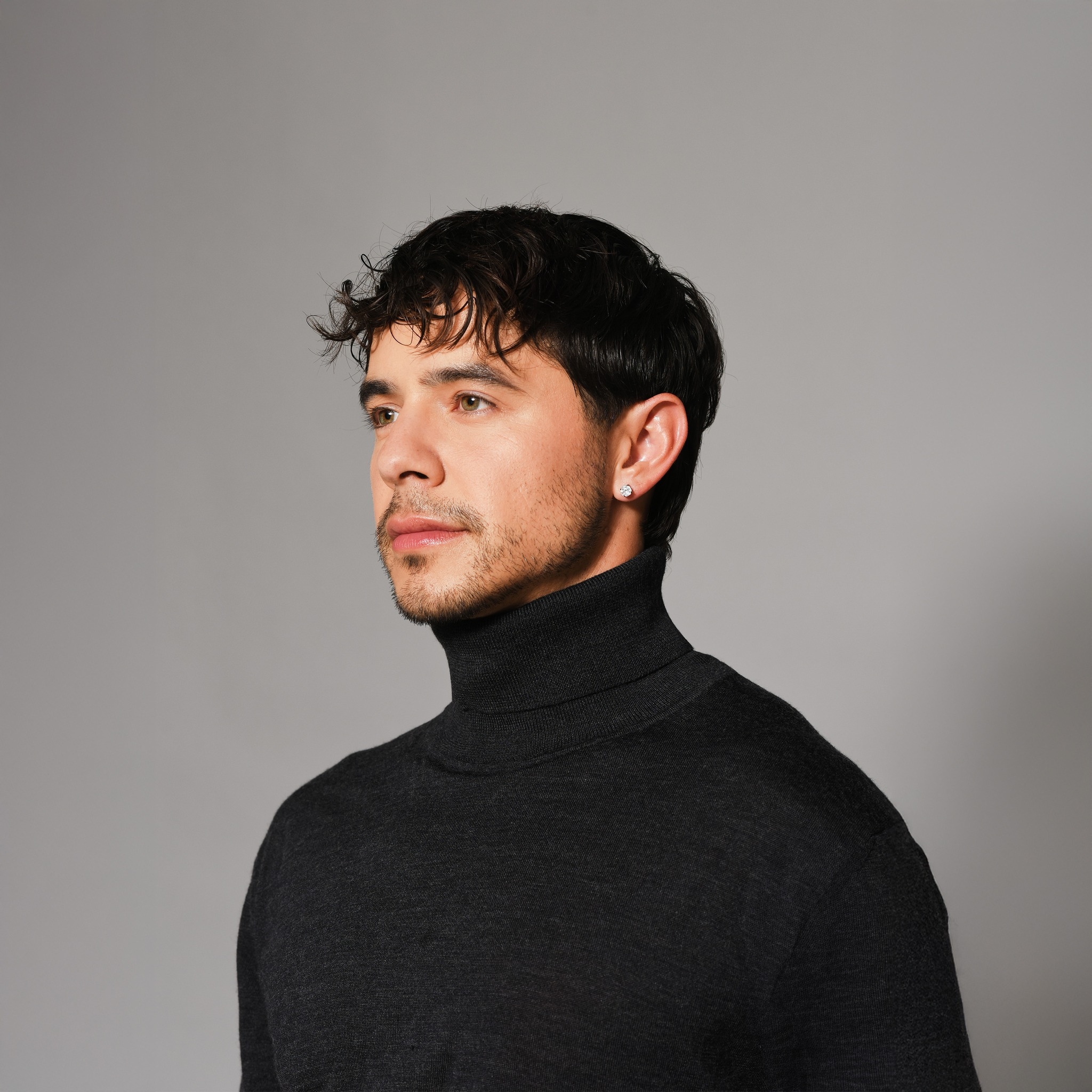
Even the rain couldn’t keep the crowds away as American Idol alum David Archuleta took the stage at The Abbey in West Hollywood, celebrating the release of his latest single “Freedom,” – an homage to George Michael’s iconic anthem. “Freedom” comes on the heels of the 35th anniversary of the original anthem and it couldn’t be more timely as the LGBTQ+ community continues to face political persecution. The song celebrates Archuleta’s newfound freedom after coming out and dealing with a complicated relationship with his Mormon upbringing, while exploring his sexuality.
Archuleta happens to have been born the year Michael released “Freedom.” His music served as an inspiration in Archuleta’s coming out. Michael’s music took on new meaning for Archuleta, celebrating a freedom that he craved for himself growing up. Being able to pay homage to Michael is a testament to the personal growth Archuleta experienced since coming out in an Instagram post in 2021.
“I’m finally free from worrying about what is right. Does that look okay? Am I within the lines I’m supposed to? None of that really matters. Of course, we want to still be good, but the things I thought I needed to do, or the way I had to behave or act or say or think to be good, I now realize was a construct that someone else had. They were very black and white and the community that I was in created this safe little space that worked to an extent for certain people,” said Archuleta in an interview with LA Blade.
“Now I realize that they didn’t have all the answers that they told me and convinced me that they had. Sexuality, especially when it comes to queerness, is not what they thought it was. I can go ahead and live my own life now and it’s okay to explore that sexuality and sensuality. I’m an adult. It’s the freedom to explore yourself and also create a new identity in yourself after trying to live someone else’s idea of what you’re supposed to be your whole life up until your thirties.”
Archuleta’s vocals are soulful and mature here. He pays homage to the original, but also makes it his own.
“I thought it was a great message to tap into. It is an iconic song with an iconic video and quite the story that he had. He was a pop star, a heartthrob, and didn’t choose to come out. He got outed and he just owned it. There could have been a lot of other ways to go about that and I feel like the way he did it was so powerful and made him even more legendary because he really tapped into his sensuality and continued to consistently be one of the greatest pop stars in the world,” said Archuleta.
“I tried to stay pretty true to his version. At first, we actually made a dance version of it but decided to backtrack from it and say, you know what? This is George’s legacy and it’d probably just be better to just stay true to his energy that he put into it. And also stay more true to my energy. I decided to stay true to an MTV unplugged version that he did with a choir. I have gospel roots. I still love gospel music even though I don’t believe in it and what it’s saying and the messaging like I did before,” he reflected.
“It used to be everything for me, the performance in the emotion and the way you connect in your core to singing. I thought it was a beautiful way to combine my two passions of moving forward and being free, but also loving the soul in music. I felt like there was some great soul energy in there. I was able to get really gritty, even get a lot of growling, something I haven’t done for quite a while, I feel like in my music,” he said.
“Freedom” comes at a time when every day LGBTQ rights are being called into question. The timing is not lost on Archuleta.
“I think it’s unfortunate that the LGBTQ+ community always has to be targeted because of being a smaller group. Living our lives does not really enter fear with anyone else. But because fear-mongering works in the news, it works in politics, it works in rallying people behind someone to feel like they have to fight this cause. They are blaming the community for issues and fear-mongering and feeling like the queer community’s a threat to families and to religion. When a lot in the queer community are religious. They are actively participating and fully believing and are a part of families. They have children of their own. It’s just strange that politics click baits and instills fear to not take responsibility for the real issues that are actually impacting people. We were making great progress. It was so much easier for me to come out when I did versus when George Michael came out and now it’s back to a place where the fearmongering is getting people, especially the trans community.”
Archuleta’s personal journey continues to evolve. He has certainly thrown off the shackles of being branded as the innocent Mormon kind on American Idol.
“I don’t really know what my brand is anymore. I think as I release “Freedom,” it’s kind of like a rebranding. I’m still me, but I’m still also evolving. I feel like I’ve changed so much in the last two years. I’m having a fun time. I keep trying to push my boundaries and say yes to things that I wouldn’t have before. Even to the point where I’m writing songs and writers will be like, “David Archuleta can’t say that!” I’m like, well, I just did and I’m David Archuleta. But people sometimes feel weird and I guess it’s because I’ve always been squeaky clean. I’m not a Mormon anymore. I’m out and I don’t really have this religious ideology that I have to abide by. I am David, but I don’t have the same limits on me that I had before.”
Archuleta has more new music on the way and this summer, he will release his memoir. Writing his book was bittersweet for David, revisiting his past came with a few bumps along the way.
“I feel like it was traumatic. I had to take breaks. It’s like opening Pandora’s box going into your childhood because I feel like sometimes I’m too honest. You see some of the faulty programming that you still have wired in you and you kind of question like, why am I still abiding by that? If it happened so long ago, why am I still letting it affect me? Why is it still part of my belief? I’ve had to work through a lot and it’s been a more difficult process than I thought it would,” he said.
“I thought it’d be hard to write because I didn’t know what I was going to talk about. But that wasn’t the hard part. What’s hard is processing the emotions, the anger, the grief, the anxiety, the traumatic responses you have. But it’s been good. I’ve definitely processed a lot of my religious things. I’ve processed a lot of my internalized homophobia and just sexuality in general. It’s been interesting to reflect on the root of all of those things. And not just ideologies, but just realizing it’s not just a belief, it’s sometimes your genetics that make you the person you are. A lot of good self-reflection for sure,” he continued.
Archuleta’s fanbase continues to thrive along with each evolution the singer has gone through. He is grateful for his fans and his mission to remain true to himself is also for his fans. There is sincerity and truth at the heart of his music.
“To my fans, thank you for being here still and for enjoying what I’m doing, for cheering me on as I grow, as I fumble. I didn’t think fumbling and making mistakes was okay to do. I thought that for some reason if you make mistakes, you’re supposed to be unforgivable. And to see how forgiving of a following I have to let me learn and to experiment and to explore. That’s why I relate to George Michael’s “Freedom” because he had to explore in front of people. And of course, you want to keep parts of your life private, that’s what I prefer. But sometimes things just end up being people’s knowledge that you don’t even know, like processing religion and coming out, sexuality and dating and getting to know people and even learning how to be physical with someone,” he said.
“I’m going to continue trying to figure myself out. But for people to be excited and for me to finally have this part of time of my life is great. I just hope we continue having fun, unleashing more, and freely being ourselves and giving us the grace to figure that out even if it takes some time,” he concluded.
“Freedom” is now streaming on all major music platforms.
California
Community leader reflects on loss from the Eaton Canyon fire one month later
‘Showing up for community is actually very political’
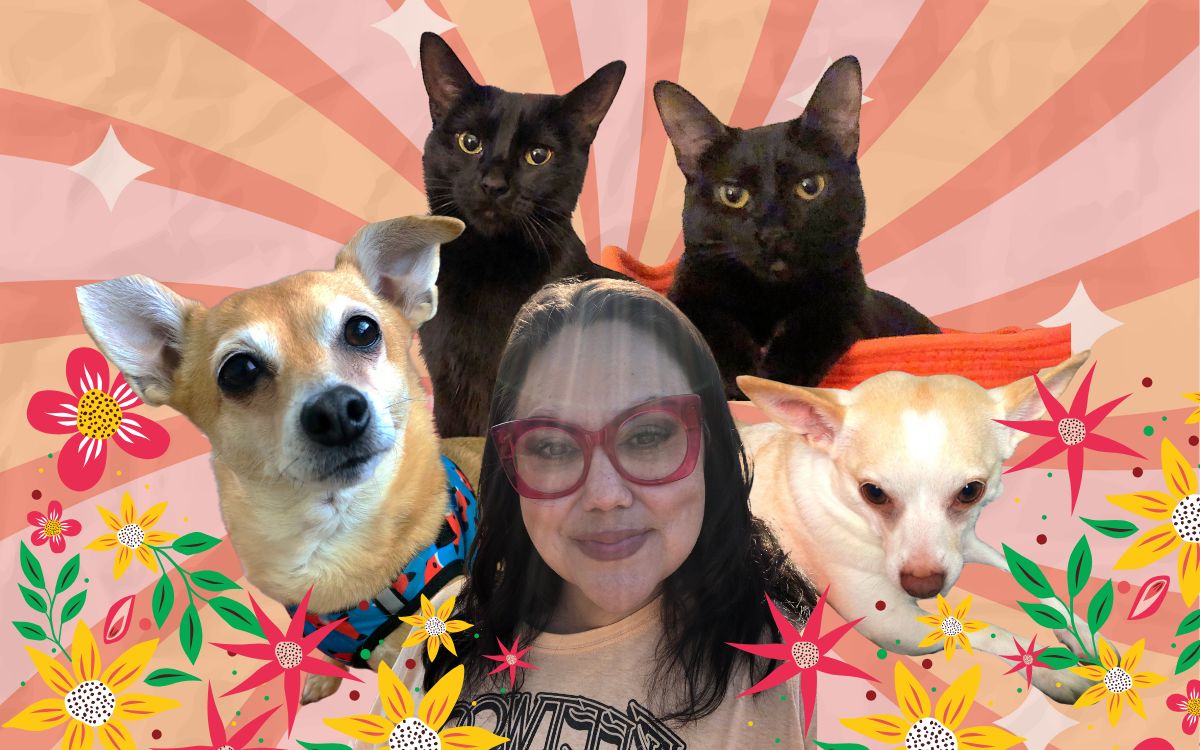
Melissa Lopez, 46, was at home with ‘the coven’ – her two dogs Foxy and HoneyBee, and her two cats Stevie Nicks and Dulce – when she got a notification from Southern California Edison saying there might be a possible power shut-off in her area on the morning of Jan. 7.
Lopez lived right off of Lake Ave., in Altadena – a city that sits at the bottom of the Eaton Saddle near Mount Markham and San Gabriel Peak in the San Gabriel Mountains, part of the Angeles National Forest.
The fire stretched across 14,000 acres over the weeks it took to contain it. The latest report released on Jan. 27 by the LA County Fire Dept., listed 17 civilian fatalities, nine firefighter injuries and thousands of threatened, damaged and destroyed structures as casualties of this fire.
Lopez’s was one of the structures that was destroyed shortly after Lopez and her four pets evacuated.
She recalls that she was watching the news about the Pacific Palisades fire when the reporter got notice that there was a fire starting up in Eaton Canyon, announcing it live on the news. At that moment Lopez felt her stomach drop.
“The second I heard that, my stomach just dropped, because when you live in Altadena, you kind of get notices of brush fires all the time. But, I knew this time was different because of the intensity of the wind,” recalls Lopez.
Lopez, whose pronouns are she/they, is a licensed clinical social worker and mental health therapist who works primarily with queer clients in the Los Angeles area. They also have over 100 thousand followers on Instagram as @counseling4allseasons, where they regularly post and repost memes and educational material that is relatable, relevant and helpful for queer, trans, BIPOC, disabled and otherwise marginalized people. Lopez is known as a community leader who has been actively outspoken about issues that are intersectional with race, genocide, immigration, capitalism, patriarchy, queerness and mental healthcare.
At the time of the interview, Lopez was having a particularly hard day as it was the one month mark since the start of the fires that burned through Altadena neighborhoods.
“Today is a hard day. It’s the one month anniversary of when I evacuated Altadena,” said Lopez in an interview with LA Blade. “I feel really pissed today. I’m pissed that so many things happened that could have been prevented.
Lopez recalls that on Tuesday Jan. 7 when the Santa Ana winds were blowing the strongest, she received the notification about the power possibly being shut off, but during the time leading up to her evacuation, she recalls that the power was never shut off. All the other alerts she received came after the fire had already started.
As she was preparing to evacuate, she says that she was in communication with many of her friends and nearby neighbors.
“It was really confusing because I was texting a couple of people and some were saying they hadn’t received [a notification], while others had,” said Lopez.
At that point, their own instinct and intuition led them to make the ultimate decision to begin evacuating.
“Everything’s kind of a blur, but I started to just grab the dogs and cats,” they said. “So I started getting all of their supplies like their food, litter – everything they use.”
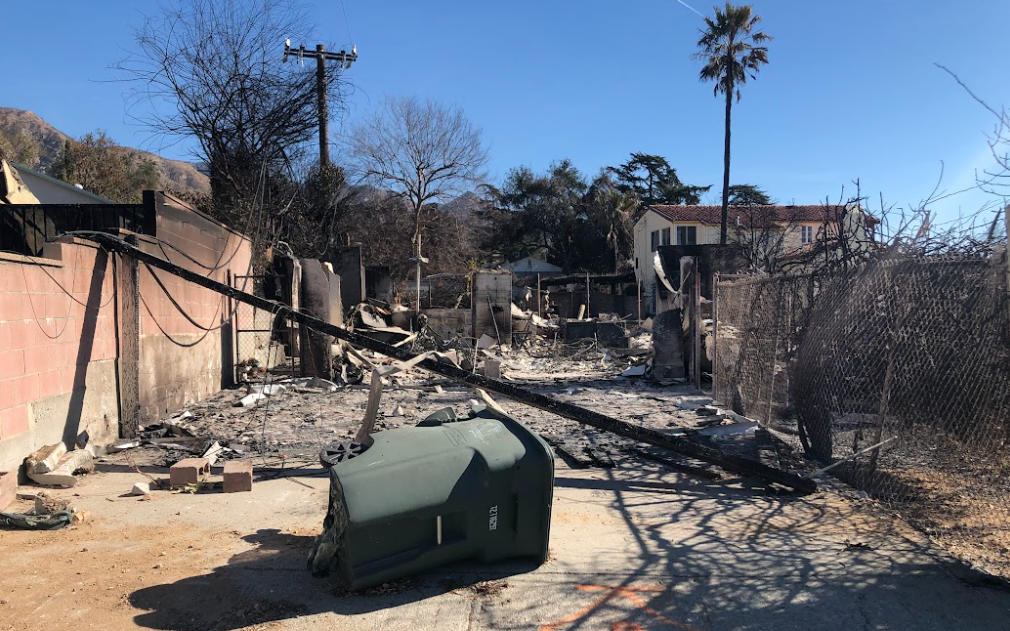
The aftermath of the fire on the property that Lopez rented a back house in (Photo courtesy of Melissa Lopez).
As soon as she was able to find short-term housing through AirBnB, she began organizing a group now led by a colleague of Lopez, to help people who had been directly affected and displaced by the Eaton Canyon fire. In the group, they discussed the experience of making the decision to take the evacuations seriously and begin gathering their belongings. She says she even felt ‘silly’ at some point, because she believed she would just be able to return the following day.
“What I tell people now is that I don’t care how silly you feel. I don’t care if you pack up half your house and feel silly about it. If your house ends up burning down, you will be so grateful for it because there are so many things I wish I would have taken.
Though Lopez says they don’t remember an exact timeline, they remember seeing the fire move in really fast and by the time she began evacuating it was complete chaos out on the main streets of Pasadena and Altadena because of the hundreds of people evacuating.
“Some of us had gotten notices, some of us warnings, some of us hadn’t,” Lopez recalls the confusing ordeal.
The smoke began to cloud the area so Lopez put her dogs into her car, but struggled to get her cats into a carrier and one of them was almost too scared to grab. She was able to make it out of the danger zone with all four of the members of ‘the coven,’ as she likes to call them.

Lopez gathered her coven and evacuated, saying goodbye to many of her belongings (Photo courtesy of Melissa Lopez).
“I had a friend who was going to take us in who lives in San Marino and driving there is basically a straight shot, but because it was so windy, some trees had fallen over and some of the [street] lights were out, so it was all really chaotic.”
Lopez believes that the community support she has received since the evacuations has gotten through the hardest parts of the experience. Mutual aid came to Lopez’s rescue during this difficult time. Navigating the resources and legal assistance was incredibly difficult because of the stress, trauma and grief she is still currently experiencing.
The Eaton Canyon fire burned through a large part of Altadena, an area that is predominantly and historically Black, Latinx and working-class.
“I think it’s important for folks to remember that showing up for community is actually very political,” said Lopez. “I want to encourage people to show up and even if you don’t know people, show up. Even if you don’t f*cking like people, show up.”
Lopez says they are very grateful for the community that showed up for them and that it is not only important to show up for this current disaster, but for everything marginalized communities are currently facing. They received many messages on IG from people offering their support in a variety of ways and that was all impactful to Lopez. They say that a lot of the support they received was from people they directly and personally knew, but a lot of it also came from people who were complete strangers.
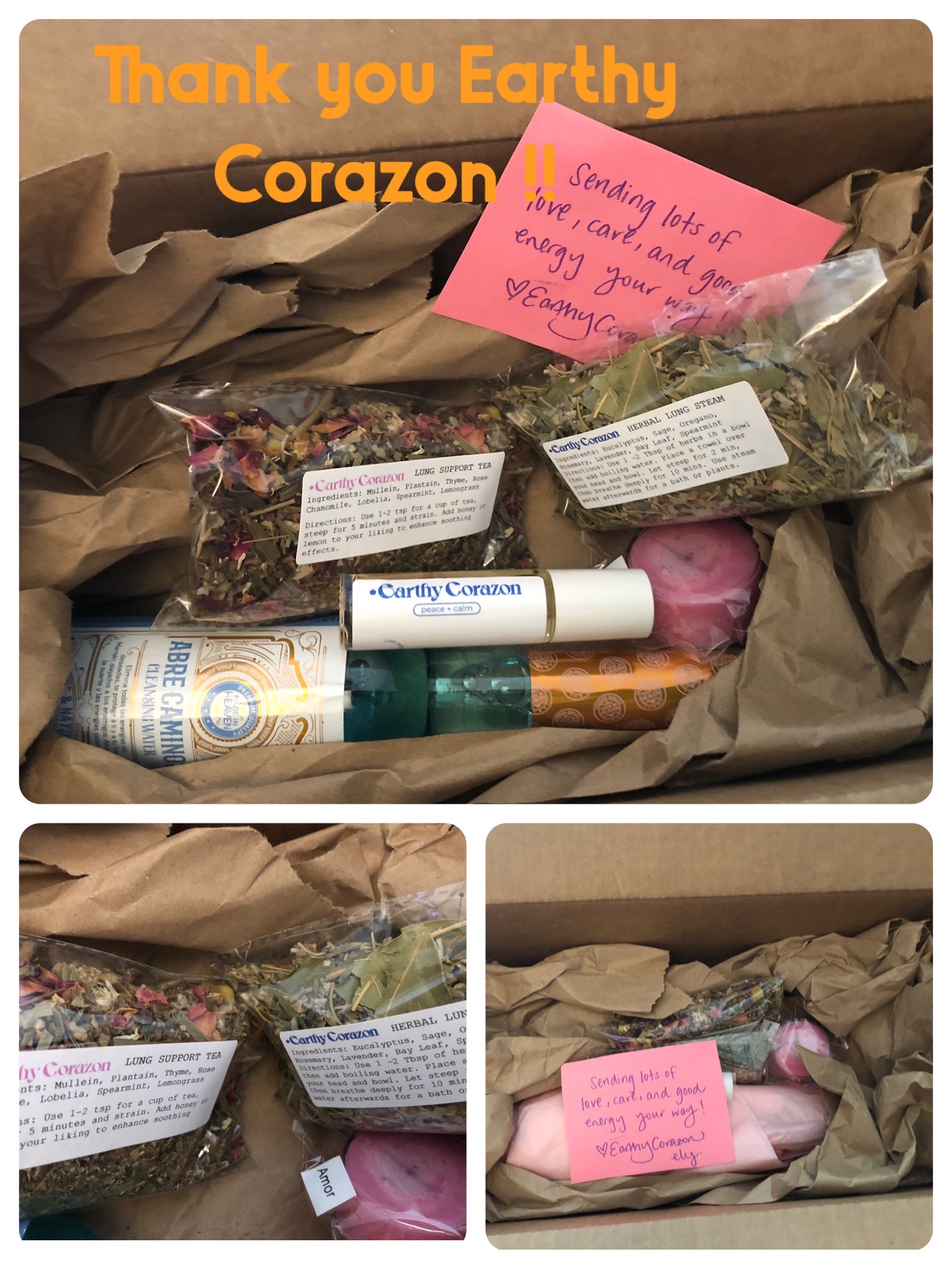
Lopez received holistic healing care packages from businesses like Earthy Corazón (Photo courtesy of Melissa Lopez).
In Lopez’s case, she was able to get her monthly rent for January and security deposit returned. She says she realizes that this is not the case for most people who are also navigating the aftermath of this disaster.
“I do want to highlight that I think tenants are having a really hard time because a lot of the resources and a lot of the support goes to homeowners and that is obviously a huge class issue,” said Lopez. “One thing I tell people now is get the f*cking renters insurance.”
The cause of the fire that took weeks to fully contain is still under investigation and many renters and homeowners await answers from insurance companies on their long path toward justice and permanent housing.
Features
Out at the Fair Kicks Off Pride Season In SoCal
OATF continues to forge ahead with queer representation at local county fairs
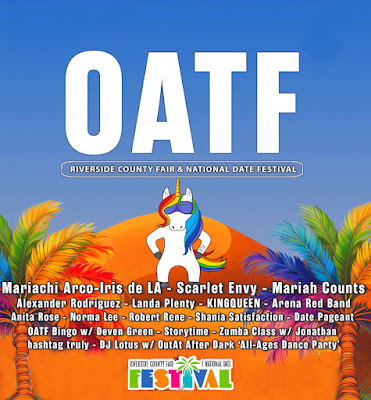
Though the LGBTQ+ community is under attack day after day, queer organizations are not giving up the fight and instead are choosing to forge ahead with an even louder voice. Out At The Fair (OATF), is kicking off LGBTQ+ event season with a bang this week. Since it began in 2011, Out at the Fair has become the official LGBTQ+ event of the fair industry.
This year’s season starts at the Riverside County Fair & National Date Festival on Saturday, February 15th at 11 am. The Glam Show will feature a performance from Drag Race alum Scarlet Envy, who also appeared in the franchise’s All Stars and UK vs the World iterations. In addition to a number of California dates, OATF will appear in New Mexico, Oregon, and Alaska.
Simply put, it is a day the queer community gathers and takes over stages at your local country fair. This year Out At The Fair will appear in 13 cities in four states. The organization provides visibility for the LGBTQ+ community and creates an inclusive day at the fair with main stage music performances, drag queen story time for youth, community resources, health resources, giveaways, family-friendly activities, and a grand finale Glam Show featuring drag performances.
In this LA Blade exclusive, we chatted with Out At The Fair CEO and Founder William Zakrashek. Coming from a nightlife and DJ background, Will and his partners have kept OATF going strong, despite political and queer-phobic setbacks. The production team that travels on the road to each of the Fairs has been pretty much the same from its inception, a testament to the mission and professionalism of the organization.
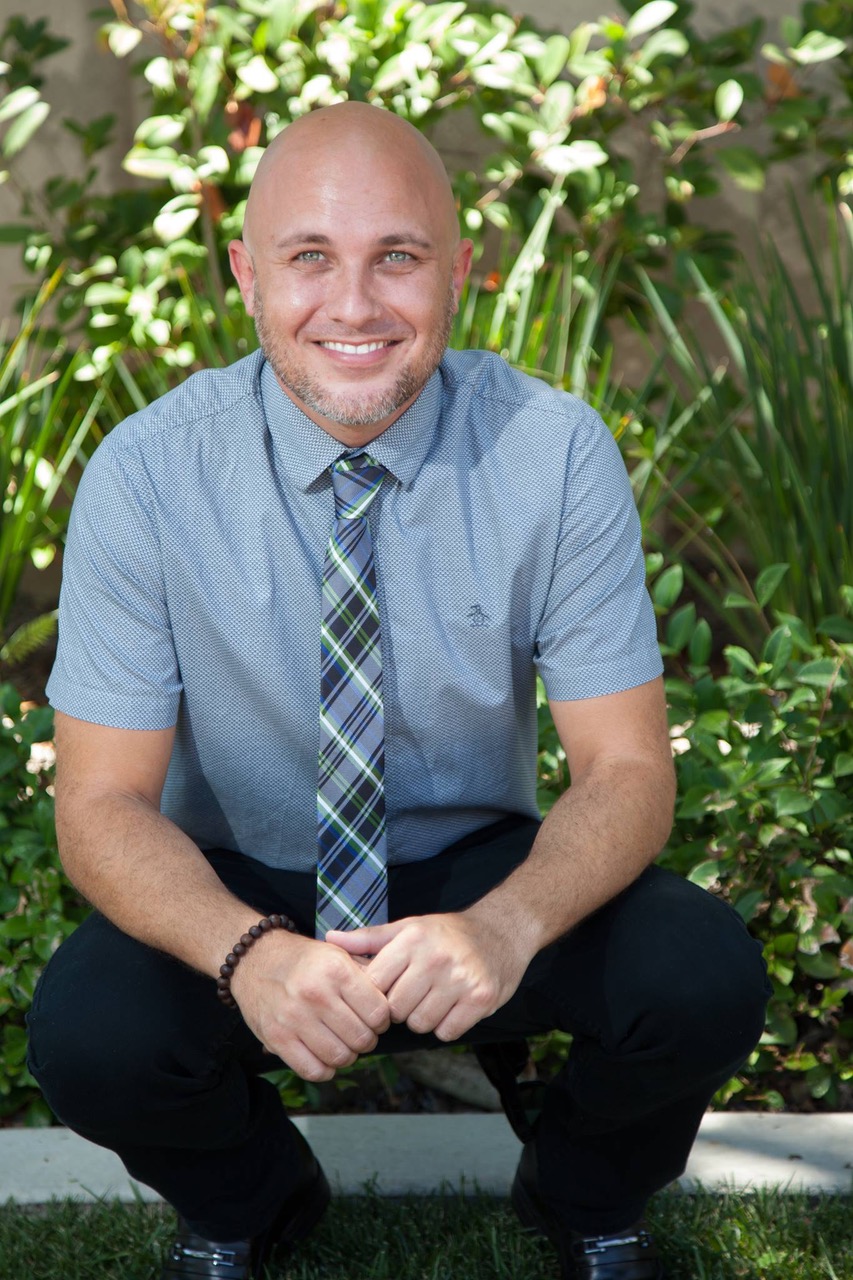
OATF Founder William Zakrashek (Photo courtesy of OATF)
What was the inspiration to start Out at the Fair?
In 2011 we went to the San Diego County Fair and noticed there was no representation of the LGBTQ+ community so we just checked in on social media calling it the “Unofficial Gay Day.” Honestly, we didn’t think anything would come from it until the following year I got a message on social media asking if we were doing the gay day at the Fair again. We made an official Facebook event that year calling it the “Unofficial Gay Days” and were invited by Luis from Marketing at the SD Fair. They welcomed our full group to the fair, gave us pins, and took our photo. The following year I was invited to official SD Fair planning meetings and the vision of Out At The Fair came together and the rest is gay history now.
What have been your biggest challenges in producing these events?
Out at the Fair has to transform a conservative industry while changing the perception of the county fairs to our community. Because of the family-friendly nature and conservative backgrounds of Fairs, the queer community hasn’t felt like they can be themselves. I have to say with years of work, it is now. Every location with an OATF not only showcases our community to the full Fair but now welcomes the community to events at the Fair, 365 days a year. We hear from our Fair partners that the uptick in our community coming to the grounds beyond just county fair time had a huge increase.
Have you had any pushback from the straight, conservative community with OATF’s presence?
We have had the normal pushback that Prides get with protestors outside of the gates or rude verbiage from someone walking by our booth, but it has never been anything where we have felt threatened. We have a rule at the booth, if someone is video recording you and you do not feel comfortable, video record them back so we can handle it with the Fair teams. We work so closely with locations to make sure every year we get better and better at creating that safe space.
But sometimes, that pushback comes from inside the Fair industry from production crews that do not have the same values as OATF. They limit their responses, limit the info we get to pass on to our partners and come up with any way possible to make it harder for us. The problem with their plans is that our Fair partners know about these struggles so it will only hurt their own relationships in the end.
What have been some of the biggest achievements of Out at the Fair?
Out At The Fair won the highest business award from the Fair industry called the Barham Award in recognition of our reliability and excellence in what we do. But the awards aren’t the real achievements we have made when it comes to progress for our community. We have created the first LGBTQ+ safe spaces in some of Fairs’ histories (some over 100 years!), producing stages, bringing drag to the fairs, and building out a foundation for a real connection. This summer we will be doing our furthest north Glam Show 160 miles south of the Arctic Circle in Fairbanks, AK! It’s pretty incredible the opportunities we can open up to our talented community that wasn’t there before.
You travel with your crew from city to city, what are the realities of life on the road?
Where do I even start? You better love your business partners and understand that the privilege of privacy during Fair season isn’t a thing. I have to say, don’t eat a Subway at a gas station because we have seen food out at 2 AM while taking a pee break. Tuna fish needs a fridge. We have to haul a trailer with us from location to location for all the setups, so between sleeping in the truck on the side of the freeway with our two dogs or hitting an elk in the middle of Arizona at midnight on our way to New Mexico, the event must go on. Even when the state trooper is telling us to stay at a hotel, we had to push on with part of the front end missing on the truck and elk fur all over it. Albuquerque or Bust!
I think the craziest thing I have seen was after driving back from Oregon last summer when we took the Nevada way because the 5 Freeway is no fun with a trailer. But there was a massive fire north of Sacramento and it took us six hours to drive through the smoke while it rained ash on us. We really get to see all parts of this country while driving through it.
What do attendees walk away most with?
A real sense of humanity. Life has just been so crazy in the past years and seems to be staying on that trend. The love and feeling of acceptance that happens during an OATF day is hard to describe. When you see people who obviously had no idea it was the LGBTQ+ stage area but sat down, started watching talent, and never left, is a great thing. It’s really cool to be able to showcase our community to people who wouldn’t go to a Pride since the Fair is such a mix of the general public.
In addition to scheduling well-known national performers, you work with the city’s local queer talent. What have you learned from working with entertainers out of town, how does their queer experience differ from Southern California’s?
This is my favorite part of doing this type of event. We really do try to create programming that fits each area we serve. Drag is just as different in New Mexico as the mix of music you would expect on the stage from our festival at the San Diego County Fair. There is some amazing talent in rural areas that need to be showcased more and I am so proud we are able to give those chances. From artists in New Mexico, Oregon, California, and Alaska, the one thing they all have in common is the appreciation of being given a platform none of them thought was possible.
OATF kicks off this season at Riverside County Fair, what can audiences expect?
This OATF is always the first Pride day of the year in California and 2025 is our 3rd Annual Celebration in Indio, California, and will be our biggest yet! We are thrilled to have RuPaul’s Drag Race superstar Scarlet Envy headline our Glam Show, Drag Race guest-judge Deven Green host our OATF Bingo, and a full day of family-friendly entertainment on the Pageant Stage. You can even catch the first LGBTQ+ Mariachi group perform & grab the full family for Out At After Dark w/ DJ Lotus for our all-ages dance party. For the first time, there will be an ‘All-Inclusive’ bar on site presented by KGay Radio and we will have some amazing local queens to mingle with. Make sure you stop by the Out at the Fair® booth because Butler Amusements is partnering with us and the first 150 people will get a ticket for a free Ferris Wheel ride. We really do try to build programming for everyone & showcase the community. Check out everything going on our website today.
How will 2025’s Out at the Fair be different than past years?
There are some locations in rural America that aren’t ready for drag shows and queer artists BUT that doesn’t mean their fair doesn’t support what we do & our community. So, for the first time in 2025, we will have Safe Space locations. We want to build a space that is safe for the LGBTQ+ community in areas where it was never possible.
Why is it so important to have a queer presence at Fairs?
It is so important because there is a fair in everyone’s backyards and those were made to showcase the community they serve. Our community lives in every neighborhood, town, and rural corner of this country and they all deserve to be celebrated. There are also queer people inside the Fair industry who have never been able to perform as out performers. We have had a few bands tell us that until we were around and helping change the perception of the LGBTQ+ community, they had never performed before as themselves. From 4H kids to vendors, and office workers, there are literally queer people everywhere and it is an honor to make them finally feel welcome in an industry that never really embraced us.
An example of this was in Oregon, where we met a trans community member who had transitioned between the Fair season but wasn’t going to come back to work until they realized OATF was now at their Fair. Even the guests who don’t have a supportive family at home feel that the Fair is the only place they can be themselves. In Sonoma County, we had a few youths stop by our booth, and grab rainbow flags, but put them quickly into their bags. We asked them why. They told us that their family doesn’t approve of them wouldn’t approve of them being there and thanked us for having a welcome space. They quickly turned around and ran away down the midway.
How are the political changes toward the LGBTQ community going to affect Out at the Fair?
For now, we are seeing the people who didn’t align with our ideals be more vocal. We have also experienced an unfortunate downtick in sponsorships. We will keep pushing through! No matter what the ‘rules’ these new political times bring, Out At The Fair will always be a safe place for the full LGBTQ+ community. We also have been working closer than ever with our Fair partners to ensure the safety of these spaces. An example is Riverside County Fair will have the Riverside County Sheriff on site, Indio PD on the perimeter, their own private security, and Fire & Medical onsite. If you see something, say something so we can keep every public event safe this summer for everyone.
How can our community support the efforts of Out at the Fair?
Come to an Out At The Fair this year, we would love the in-person support and your presence speaks volumes nowadays. But if you can’t make it to one of our 13 locations in 4 states, we do have merchandise available online starting at $7 and 100% of these proceeds go to the OATF tour. It helps us to give the smaller Fairs the same production & attention as our largest Fairs. Visit www.OutattheFair.com to learn more about what we do & shop our merchandise line.
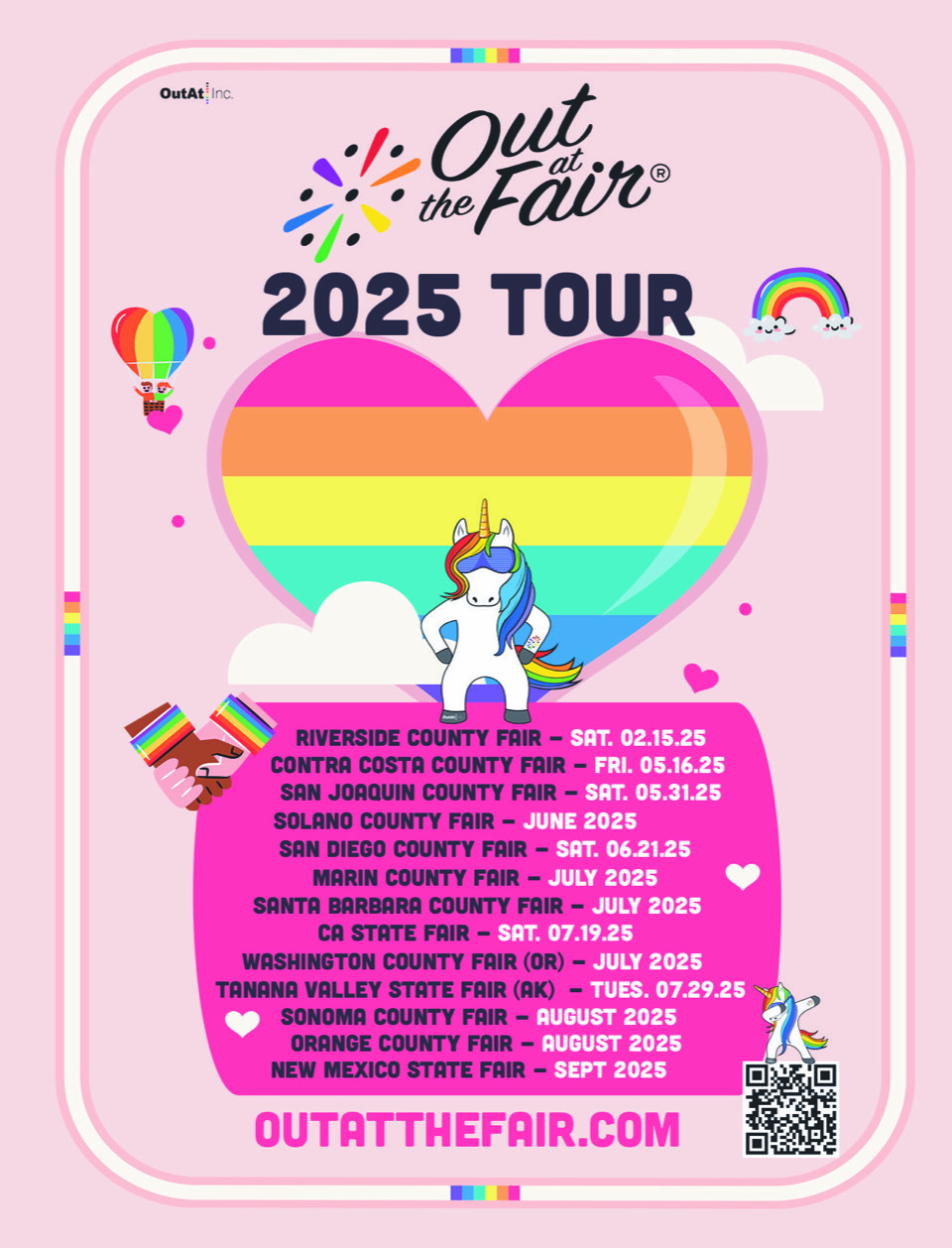
OATF Tour 2025 flyer (Photo courtesy of OATF)
a&e features
An invite-only LGBTQ+ app surged in popularity after Trump’s executive orders
Famm Connect provides a safe haven for job seekers and community support amid LGBTQ+ attacks
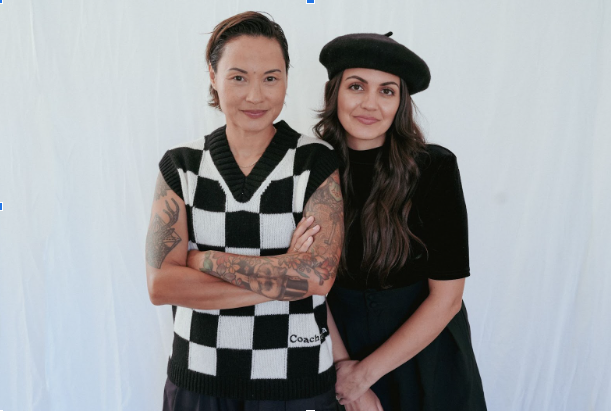
President Donald Trump’s latest executive order, restricting transgender individuals from serving openly in the military, has sparked a surge in activity on Famm Connect, a new professional networking app designed for the LGBTQ+ community.
The Secretary of Defense, Pete Hegseth, has a 30-day deadline for submitting a plan to execute the order. Until then, many have been turning to the invite-only platform, created in Dec. 2024, to find support, resources and career connections in the face of increasing change.
Its California-based co-founders and married couple, Marianna Di Regolo and Cat Perez, said their app has grown more than 70% within the last weeks. Di Regolo noted that the app provides a safe digital space for members fleeing those opposing their community.
“Famm Connect is our response to Trump and really anyone else who creates barriers for or discriminates against LGBTQ+ folks. So with Trump signing executive orders against our community and major organizations cutting DE&I programs and platforms like Meta removing protections for LGBTQ folks, spaces like Fam Connect are more important than ever,” Di Regolo told the Los Angeles Blade.
The LGBTQ+ community, according to Di Regolo, feels unprotected on other professional apps where hateful comments aren’t filtered, so her app serves as a haven for those looking for new jobs.
“Just in general, as a lot of us have seen, quite a few LGBTQ+ folks don’t feel safe on a lot of the other platforms, and they might be growing in their career or looking for a job or just looking to connect with other folks professionally,” she said, adding: “They’re on our platform letting folks know, ‘Hey, I’m looking for X, Y, and Z job,’… and they feel safer and more comfortable doing it in a secure space.”
As attacks on LGBTQ+ rights intensify—from political figures rolling back protections, advocates are doubling down on support for their communities, according to a spokesperson at GLAAD, a non-profit committed to LGBTQ+ advocacy and cultural change.
“Now more than ever, LGBTQ+ people are stepping up to take care of and support each other and our families. No matter what rhetoric is spewed [by] government officials or anti-LGBTQ+ extremists, our community and allies will persevere. Building community, finding and giving support, and making connections in spaces where we all can feel safe will be a critical part of surviving and thriving, no matter what we are up against.”
Trump said in his latest executive order against Trans troops that “For the sake of our Nation and the patriotic Americans who volunteer to serve it, military service must be reserved for those mentally and physically fit for duty.” This message didn’t resonate with Perez, who said Trump’s executive order is fear-mongering, among other things.
“It’s absolutely ridiculous. There’s no basis [on] which that decision was made. It is absolutely transphobia and a fear tactic that they are using and a general strategic tactic that Trump and his administration are using to distract the American people from real issues that they should be focused on for this country,” she said.
Perez also argues that his stance not only dehumanizes trans people but also ignores the reality that: “Trans people are humans. They’re human beings. “They’re absolutely capable of serving in the military, and they have, and it’s just disgusting that that is the message that he is putting out there.”
JaRel Clay, the vice president of the Board of Directors at SpeakOut, a non-profit that aims to create safe spaces across LGBTQ+ communities of color, says Famm Connect is a critical employment resource for “the trans community in the midst of attacks coming from the Trump administration.”
“We know that there is power in community, and especially for this community facing heightened risks, both in their areas and federally. An app like Famm Connect is more than a tool. It’s a lifeline,” Clay added.
Clay asserts that Trump’s rhetoric regarding the lack of mental fitness of trans-serving troops is “woefully uninformed.”
“How do you suggest that their military readiness and public service are at a disadvantage simply because they are trans? It’s, again, just woefully uninformed and ignorant,” Clay said. “It’s un-American. It is the fabric of our being that we address and assess the readiness of any individual who wants to serve our country based on the merit of how they perform.”
Perez said that she sees the LGBTQ+ community coming together and showing up for one another on the app since other platforms have censored terms like “lesbian” or other words about their community.
The Human Rights Campaign claims that Meta’s new social media policies “endanger LGBTQ+ communities.” Perez says censoring their communities is incredibly problematic, so they are building up Famm Connect.
“I think for folks who are struggling right now in the community, within their careers, I think seeking out the queer community and seeking out safe and intentional spaces and really making those connections is going to be the thing that helps get you through these turbulent times,” she noted.
Contributing writer, Eden Harris is a D.C. native with a passion for uplifting marginalized voices on a global, national and local level. She has experience covering the White House, Capitol Hill, the Supreme Court and federal agencies. She covers mainly all things Africa and is committed to doing so with the highest standards that drive true equity for the continent and its U.S. diaspora.
Events
Botitas World: the business brand aimed at building community
Cafécito and Comunidad, the event to gather in QTBIPOC community

Zizi Bandera and Ty Curiel, came together to form what is now Botitas–a small business brand and organizing space for Queer, Trans, Black, Indigenous and People of Color to celebrate and embrace identity, ethnicity and community.
The co-founders of Saturday’s Botitas event Cafécito and Comunidad, say they had to close the RSVP’s because they reached capacity and were afraid of having issues with the Parks and Recreation Department that issues parking permits and sets a limit for the number of people allowed to gather at Elysian Park in Los Angeles.
“It’s our first event here and it’s an amazing turnout,” said Bandera. “TikTok blew us up.”
Bandera referenced the TikTok video they posted announcing the event and says that they woke up the next morning to see that they had well over a hundred RSVP’s for the event that they expected would only have a couple dozen people.
“We had someone who is part of our community call up the councilmember for this district and was able to talk to whoever is in charge of Parks and Rec to OK more capacity,” said Bandera. “[Eunisses Hernandez, Councilmember CD-1] also got us the tables and permits.”
Bandera stresses that the amount of people who reserved a spot for the event comes to show the need for space like Botitas.
“I thought it was going to be maybe fifteen, twenty people,” said Bandera.
The space is held intentionally for the BIPOC community within the broader LGBTQ+ community, with the intention of centering BIPOC voices that can otherwise be erased, marginalized, sidelined or silenced in broader community conversations.
“Our focus is to have these community spaces and to serve our trans Latine community in Los Angeles and beyond,” continued Bandera. “We thought about making this project a nonprofit, but we wanted to really have full agency and control over, in terms of the needs of our community.”
Bandera says that going the nonprofit route has its own challenges and obstacles because of different stakeholders. They stress the importance of their community being the stakeholders in this business journey.

Though the day was a bit gloomy with some light rain, many people gathered to mingle, chat and yap, along with some coffee at Elysian Park in Los Angeles this past Saturday (Photo Credit Gisselle Palomera).
“I’ve been working in community organizing, mobilizing around LGBTQ and immigrant issues for almost fifteen years now and I’ve always wanted to create something that was for us, led by us–queer, trans, Latine and intergenerational.”
Bandera says that they were inspired to create this space for QTBIPOC because of a report released earlier this year pointing to a loneliness epidemic that disproportionately affects LGBTQ+ people over their heterosexual peers.
The report states that ”…LGBTQ+ youth exhibit higher rates of loneliness, social isolation, and depressive symptoms than their heterosexual peers. Moreover, LGBTQ+ youth grappling with loneliness are less likely to reach out for help regarding their mental health concerns.’
The other co-founder of Botitas has different reasons to have started this business journey.
“Botitas is one day today and another thing tomorrow,” Curiel said. “Our idea came from wanting to create a brand–something that you can wear when you’re out and about in the city. A brand that is backed by people who resonate with you as Latine folks, queer, trans and that’s what we are.”
Curiel also states that the current state of politics also plays a major role in his idea to create Botitas. “We want to [create these spaces], especially in this time and age where there’s a rhetoric of people spreading hate.”
This event is in a public space, encouraging people who show up, to gather in a space that supports sobriety. The offerings included cafécito, pastries and games.
Earlier this year during pride month, Curiel says he and Bandera were looking at historic news articles and photographs of LGBTQ+ life in Los Angeles during the 1950s and 60s, from an exhibit at the Central Library in DTLA, and that’s when it hit them both that none of the people in the photos looked like them. They did not feel represented.
This moment urged them to reconsider what it means to them to feel represented, heard and seen–thus bringing about the idea for Botitas.
Follow @Botitas.World on Instagram and TikTok to get more information on upcoming events.
Arts & Entertainment
Meet the whimsical, fairy-core Uber driver who drives a car named Mollie
Nonbinary Uber driver, Caspian Larkins is rolling on Mollie– no, not that one

Forest green faux fur, rhinestones, a fabric-lined ceiling, planted faux flowers and green plastic grass adorn the inside of an anthropomorphized car named Mollie who spends her days riding off into the sunset on Sunset Blvd in West Hollywood and beyond.
The driver of this 2008 Ford Escape, Caspian Larkins, 24 and a Cancer sign, moved to Los Angeles to pursue acting and through a series of humbling restaurant jobs and other side hustles, ended up driving for Uber. Though working for Uber was not on Larkins’ bingo card for 2021, they wanted to find a way to make the experience not only fun for themself, but also for the people who roll on Mollie.
Larkins, who identifies as nonbinary and queer, grew up being one with nature in the wilderness of Oregon and when you step inside Mollie, it feels like a little magical, mystical slice of Oregonian forest–of course if it were reimagined on four wheels and zooming through traffic in Los Angeles.

Forest green faux fur and a pink ruffle with a layer of tiny fabric roses, line the doors. Stickers on the sunroof and windows reflect rainbow hues across the white leather seats and passengers. (Photo credit Gisselle Palomera)
Going viral overnight doesn’t happen to just anyone, but this iconic duo now have thousands of followers on social media and have big plans for the future.
ShaVonne Boggs, a content creator who hailed an Uber ride from Larkins, posted an Instagram reel of the ride and featured Larkins in all their fairy-core glory, driving through L.A traffic, with the viral Gwen Stefani ‘Just a Girl,’ audio clip playing over.
“I went to bed that night with a couple hundred followers on my account and I woke up the next day and I had gained like 3,000 followers,” said Larkins.
Larkins has a unique sense of style that incorporates nature, fashion and sustainability, often foraging for materials from the side of the road to add to the car and accepting donated fabrics from people who reach out to them through social media.
“I’m a forager. What can I say?,” said Larkins and then jokingly added that Jeff Bezos also personally delivers some of the items they use to decorate Mollie.
“I come across stuff on the street sometimes that I’ll pick up, put in my car and repurpose.”
Larkins says that Mollie is a little bit dinged up and bruised up from the outside, but that it’s the inside that truly matters.
There is a third character in this story that resides on the inside of the car at all times.
Jack Aranda is the name of the guardian angel of this fairytale ride. It is a miniature rubber ducky that was given to Larkins by a spiritual witch that opted for an Uber drive, over a broom one night.
“It was midnight, by Venice Beach and you know it was good vibes, but yea she gets in and we’re talking and she’s like ‘I’m going to give you this duck,’ and gives me this little tiny purple good luck duck,” said Larkins. “So I kept the good luck duck and I put him on my dashboard.”
Larkins says that ever since this encounter, the luck in their car changed.
“Red lights will always turn green for me, and sometimes someone will run a red light and miss [hitting] me and I just think it’s divine intervention because of Jack.”

Larkins poses in front of their car Mollie on a road in West Hollywood, CA. (Photo Credit Gisselle Palomera)
Larkins says that the decorated interior and its elements serves not only as a conversation starter, but also as a filter from unwanted conversations and painfully boring small talk.
“I think that since I’ve decorated my car, it’s like my filter,” said Larkins. “The people who get in and are like, ‘Oh my god,’ those are my people and those are the ones that I’m there for. And the ones that get in and are silent, I just let them sit there and soak in the rainbows.”
They say that there have been more good interactions, than bad ones and more people who ‘get it,’ than those who don’t.
Anthropomorphizing cars is nothing new to pop culture. In fact, cars have almost always had names and it is almost a part of engrained American culture to assign personalities to them based on their cosmetic characteristics.
The earliest examples on TV go as far back as the 1940s and some of the most memorable examples are Christine, the possessed, killer Camaro from Stephen King’s imaginative mind.
Or Herbie, the 1963 Volkswagen Racing Beetle from the early cartoon TV show Herbie, the Love Bug.
In everyday routine, people spend so much time and energy on and around inanimate objects, that they sort of become meaningful elements who accompany us on our journeys from here to there–and back.
“What I’m doing now with her is switching out different designs with the seasons,” said Larkins.

Larkins drives around Los Angeles and West Hollywood, picking up and dropping off people from all walks of life. (Photo Credit Gisselle Palomera)
“So right now we have our spring/summer look and a lot of the things in there are removable, velcroed and stapled.”
They say that right now they are exploring a very niche area of automotive interior design that they feel has not been explored within vehicles recently.
“It’s just hard for other people to conceptualize it and what I often describe to people, comes off as very tacky and just kind of nasty– not demure, not cute.”
Larkins feel they are really just now setting the stage for what’s possible, as far as interior customizations.
“I want to start creating this world in which design plays a bigger role in what a car could be and the experience of just being transported,” said Larkins candidly. “I want to invite people into my little delusional fantasies.”
Larkins believes that even in the present and near future of self-driving vehicles, they would like to collaborate with these major self-driving car companies and take part in designing and customizing the vehicles so that it can be a pleasurable and fun experience for riders who might feel anxiety about self-driving technology.

The inside of Mollie is adorned from top to bottom and from left to right. (Photo Credit Gisselle Palomera)
Modifying and customizing cars has been a part of the North American experience since the early 1930s. Now, attention is shifting toward the addition of technologies like Augmented Reality, to enhance the experience of driving and getting from point A to point B, and also using that technology to navigate the vehicle without a driver.
There are now endless possibilities when it comes to custom car culture and Larkins feels this is their place to explore and forage for the looks that people want and can’t even imagine.
“I want to step away from driving for the platforms and I would love to design with them,” said Larkins. “There is a group of people that are in support of this future technology and there is this other group of people that are kind of scared of it because it feels very cold and very uninviting and very new, so I would like to be the one to sort of bridge that gap for those people and make it less scary.”
The vision that Larkins has, is that they would like to reimagine the possibilities of custom interiors with interchangeable parts and additions that one could only think of as synonymous to Barbie and her endlessly fun assortment of interchangeable outfit components.
Larkins sees a long future ahead, where they have the opportunity to collaborate with airlines, rideshare companies and any other sponsors who are willing to make their visions come to reality. Until then, they will continue to weave up and down the asphalt arteries of WeHo and beyond, rolling on Mollie and working on their fairytale ending.
Features
The little idea that could: These queer, Latinx, DJs are shifting the scene in LA
‘All you jotas, grab your botas!’
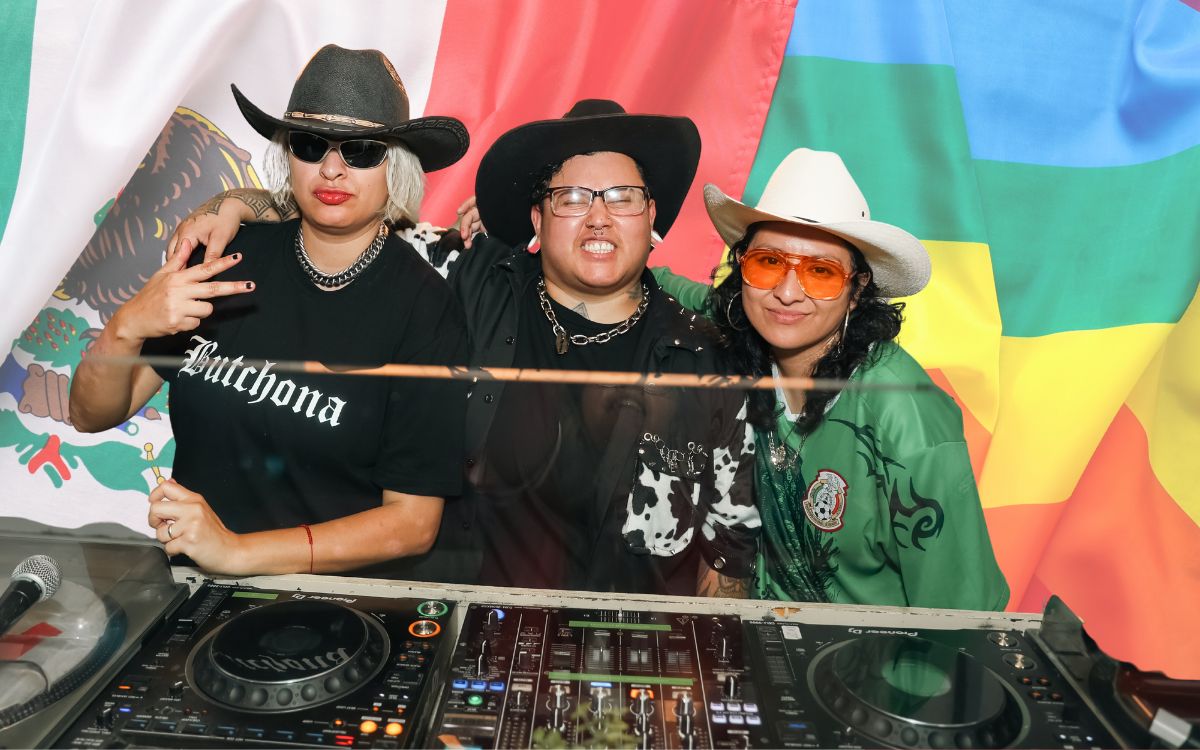
The rallying call urges all the Spanish-speaking and corrido-loving sapphics, butchonas, jotas and vaqueeras, to grab their boots and meet up at Little Joy Cocktails for a carne asada-style, family party every fourth Sunday of the month, featuring spins by DJ Lady Soul, DJ French and DJ Killed By Synth.
In Los Angeles, these three disc jockeys have embraced the word buchona, adding the ‘t’ as a play on the word butch.
The free event, now locally known as Butchona, is a safe space for all the Mexican and Spanish music-loving lesbians to gather on the last Sunday of every month.
Buchona is usually a term used in Mexico and other Spanish-speaking countries to describe a woman who is a boss– someone who exudes dominant energy or marries into a powerful position.
“I didn’t know how well [the idea for Butchona] was going to be received and my favorite part of all that, has been the looks everyone has been bringing,” said Rocio Flores, who goes by DJ Lady Soul.
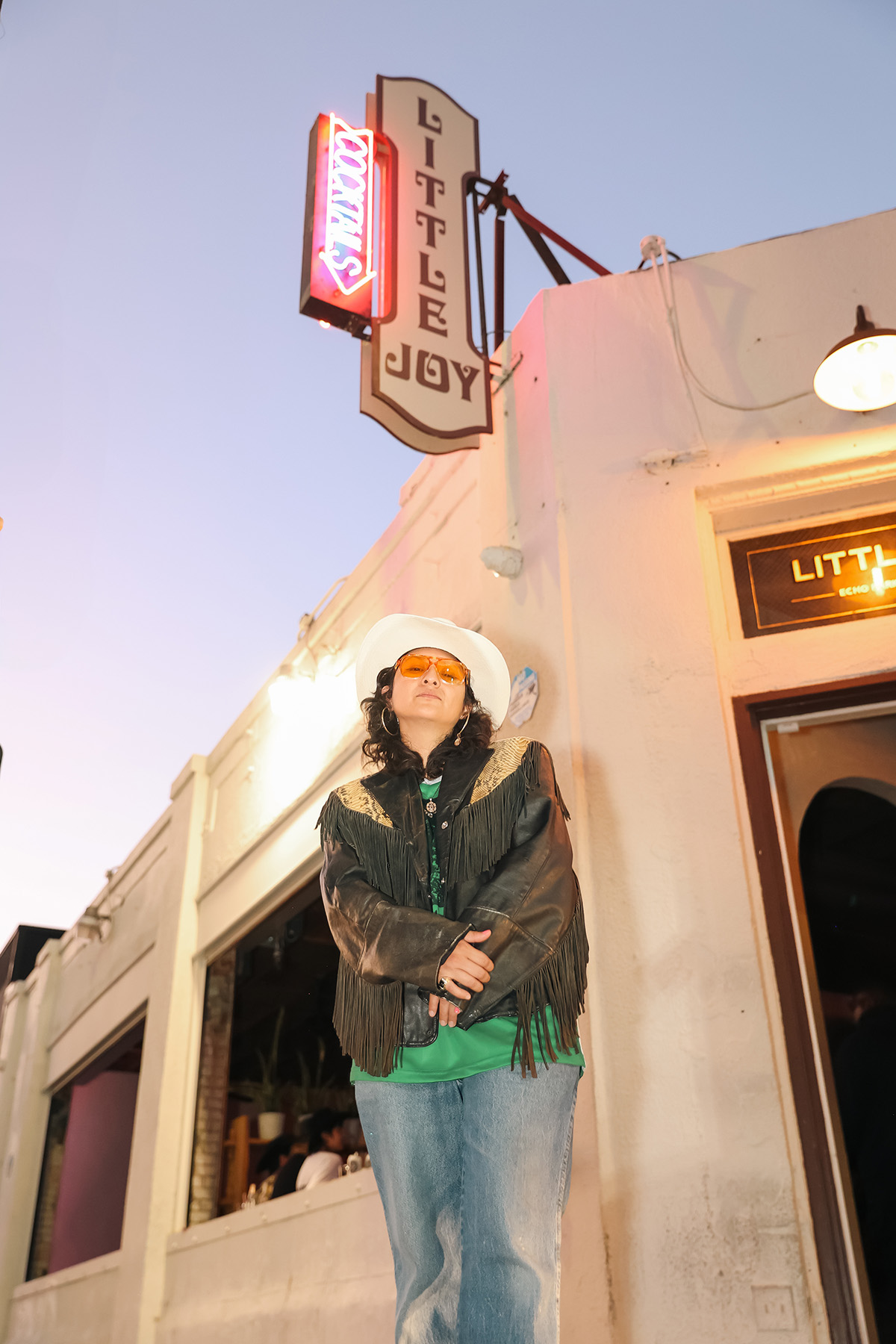
DJ Lady Soul poses outside of Little Joy Cocktails in her butchona outfit.
The event that started only a few months ago, brings in dozens of dressed-up jotas. The ‘looks’ that the crowds bring are reminiscent of how dad’s, tíos, and their friends dressed at Mexican family parties: a tejana, cowboy boots, giant belt buckle and a beer in hand.
Dressing up in these looks is a way to show wealth and status to earn the respect of other males in a male-dominated and -centered culture– that is until now.
This traditionally male, Mexican, cultural identity, is something that has never been embraced or accessible to women or gender non-conforming people. The giant belt buckles that are traditionally custom-made and specific to male identities like head of household, ‘only rooster in the chicken coop’ and lone wolf, are only part of the strictly cis-gendered male clothes that dominate the culture.
The embroidered button-ups, belt buckles and unique cowboy hats –all come together to create the masculine looks that are now being reclaimed by women and gender nonconforming people at the event curated by three queer, Mexican DJs, who once had a little idea that could.
Flores, 37, (she/her), Gemini, says that to her the term butchona describes a woman who is a little ‘chunti,’ a little cheap in the way she dresses– but in a queer way.
“That title also means that you’re a badass,” she said. “I want to look like that señor, I want to look like that dude and now I feel like I could, so why not?”
Flores says that now she feels like she can embrace and reclaim that cultural identity, but it wasn’t always that easy.
At first, her family upheld the traditional cisgender roles that forced her to dress more feminine, but she always wanted to dress like her cousins and her tíos.
“Now, I’m like: ‘Fuck that!’ I’m going to wear the chalecos and the Chalino suits,” she said in Span-glish.
The Chalino suits are traditional, Mexican, suits that were worn and popularized by Chalino Sanchez, known as the King of corridos—a genre of music that is said to have originated on the border region of Texas, Tamaulipas and Nuevo León, Mexico.
“It felt good to break into the DJ scene, but what I always noticed was that the lesbian culture was always lacking,” said DJ Lady Soul. “I would mainly see gay males at parties and a lot of male DJs.”
According to Zippia–a career site that sources their information from the U.S. Bureau of Labor and Statistics and the U.S. Census–23.5 percent of disc jockeys are women, 16 percent are LGBTQ+ and only 12.7 percent are Hispanic or Latin American.
What has always been a traditionally machista music genre and scene, is now being embraced by a growing number of queer women and non-male DJs in Los Angeles.
For Fran Fregoso, who goes by DJ French, 33, (they/she), Taurus– embracing their cultural identity came a lot easier because of their late uncle who sort of paved the way for them to come out as queer and be more accepted than he was as the first openly out queer person in their family.
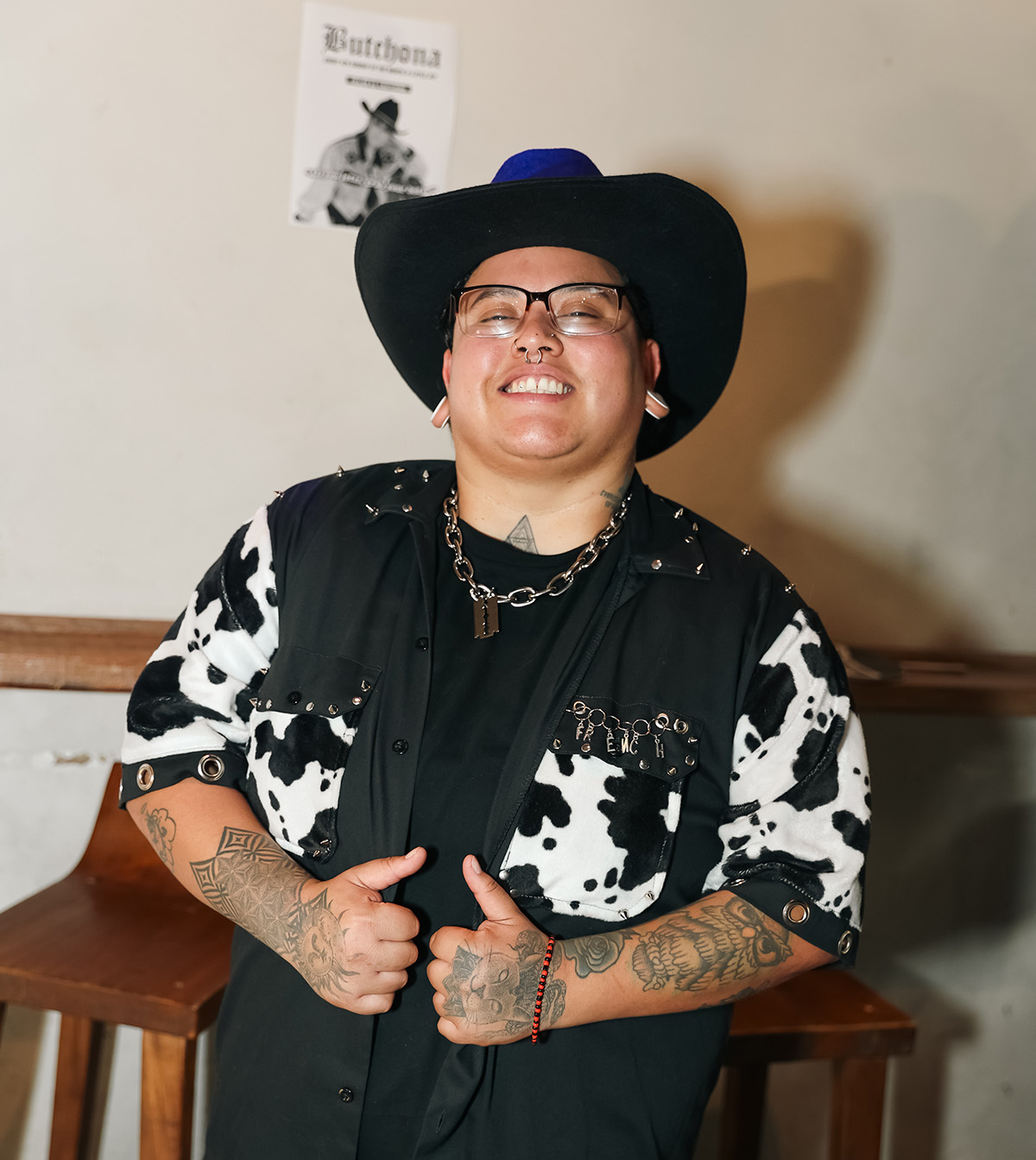
Their music journey began listening to the 90s grunge, alternative, hip-hop and metal music played by their older siblings at home.
“Then I met Vanessa [DJ Killed By Synth], and she introduced me to the industry,” said DJ French.
DJ French felt the acceptance and support to enter this music space and decided to embrace their cultural roots by playing music that they grew up listening to at family parties. They booked their first gig with Cumbiatón LA, a collective of DJs and organizers who host Latin American parties across Los Angeles, often centering queer DJs and other performers.
“When [Lady Soul and Killed By Synth], brought this idea up to create Butchona, I was like: ‘Oh, I’m in 100 percent’,” they said. “Because I love playing corridos and banda music because that’s a core memory from my childhood and family parties.”
Banda, corridos, cumbias and other traditional music is a big part of Mexican culture, even as gendered and male-centered as it has been, it is embraced by all.
“I know a lot of people in our queer, Latino, community love that music too, but they also want to be in a safe space,” they said. “That’s where we decided to make an environment for our community to dance and be themselves.”
Vanessa Bueno, 40, (she/her), Libra, who goes by DJ Killed By Synth, says her journey started about 20 years ago when she started DJing for backyard parties in East L.A. and across L.A. County.
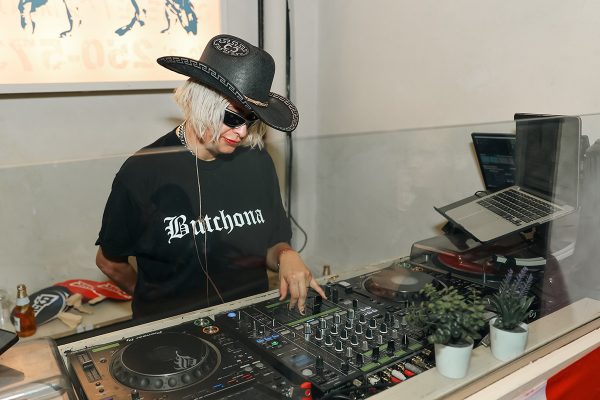
Her family is from Guadalajara, so she says that growing up she also had a lot of family parties with corridos and banda blaring in the background of memories with the many cousins she says she lost count of.
“A lot of the music we heard was bachata, banda, cumbia and even some 80s freestyle,” said Bueno.
Even while she had a ‘little punk rocker phase,’ she says she couldn’t escape that Spanish music her family played ritualistically at family get-togethers.
When they began their music journey–back in the AOL, Instant Messenger days, they played a lot more electronic music, hence the name Killed by Synth. At first, it was just a username, but then it became her DJ name.
“Later down the line, comes [the idea for] Butchona came about, and me, Rocio and French collaborated,” she said. “It’s kind of always been my goal to create these safe spaces for women and queer people, and I had been in the scene long enough to where people were willing to answer my calls to work with them to make it happen.”
For Bueno, it was natural for her to build community and embrace this part of their culture later on in her career when she saw a need for queer, Latin American-centered club spaces with family party vibes.
She started hosting Latin American-style parties, blending music, culture, and food and attracting the exact audience she envisioned. With these events, Bueno aimed to reclaim her Mexican identity and foster a sense of family and community at these events.
“We’re here to build a safe space to embrace the music and kind of not think about the machismo that is tied to it and celebrate who we are,” said Bueno.
According to the U.S. Department of Labor and Statistics, California, Texas, New York, Arizona and Washington rank the highest in employment rates for disc jockeys in 2023. There is also a recent trend in more women DJs–the study does not include gender nonconforming DJs–booking twice as many gigs as men in event spaces and concerts that host DJ sets.
“It feels like we’re barely cracking into these safe spaces and expanding our horizons a little bit,” said DJ French. “I hope this inspires other people to also create safe spaces like Butchona.”
The next Butchona event will be on Sunday, Oct. 27 and will feature all three DJs playing corridos, banda, cumbia and all the classics, for a chunti Halloween party.
Features
1st time West Texas has a permanent LGBTQ+ community center
A local volunteer died by suicide ahead of the center’s grand opening, reminding the West Texas community why such spaces are important
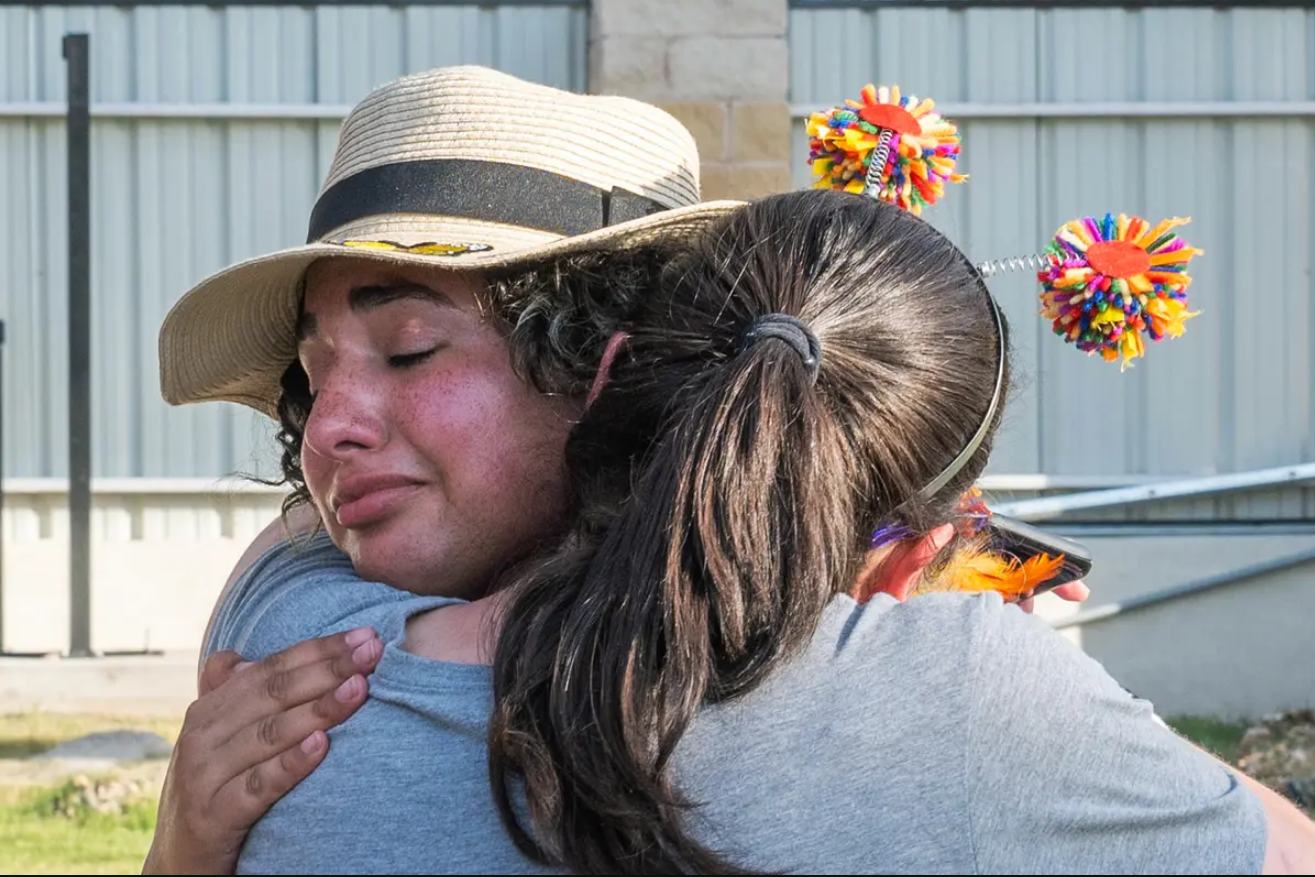
By Carlos Nogueras Ramos | ODESSA, Texas — Patty Reeves stood centerstage overlooking a park dotted with dozens of people from West Texas’ LGBTQ+ community. There were clusters of families and friend groups. A local church brought congregants who sat in lawn chairs in the front row.
The cheerful atmosphere at the fifth annual pride festival in West Texas had shifted. A suicide had rocked the community. Luna Harris, a 19-year-old gender-nonconforming person, died two days earlier.
As a warm gust carried dust through the park, Reeves delivered her speech.
“What I see in West Texas is a community that says, ‘I am here. I am thriving. You will not erase us,’” she said.
Like many present that day, Reeves, the president of PFLAG’s Midland and Odessa chapter, wanted to believe in her message. But at that moment, she couldn’t.
“I said those words because that’s what I hope for,” Reeves said offstage. “But then I thought: Are we really?”
The sudden loss hovered over the festivities meant to close a busy week of events, which included the grand opening of a brick-and-mortar community center for the region’s LGBTQ+ community.
/https://static.texastribune.org/media/files/2f3ed8e066fcafb03ed672c8657ba17e/0608%20Pride%20Fest%20Odessa%20CC%2023-2.jpg)
(Photo Credit: Callie Cummings for The Texas Tribune)
/https://static.texastribune.org/media/files/1dcb5cd428dc18adf20e4b71c6ef0d8e/0608%20Pride%20Fest%20Odessa%20CC%2040.jpg)
(Photo Credit: Callie Cummings for The Texas Tribune)
/https://static.texastribune.org/media/files/e12bcf01fc659be42e6ec9380b6634a8/0608%20Pride%20Fest%20Odessa%20CC%2031-2.jpg)
It was also, Reeves and others said, a sobering reminder that underscored how necessary spaces like the festival and the community center are — especially in a state such as Texas where Republican lawmakers and other policymakers are working to limit how LGBTQ+ people live their lives.
During the last decade, several organizations that support the Permian Basin’s LGBTQ+ community have sprung up. None have had a permanent — and visible — home of their own. That changed in April when Pride Center West Texas opened its doors to the public.
The center’s grand opening was four years in the making. It all started when Bryan and Clint Wilson moved to Midland, from Florida in 2020. Amid the COVID-19 pandemic, the couple shuttered their consulting services to move back and be closer to family.
The married couple had been active in LGBTQ+ nonprofits in Florida, and registered Pride Center West Texas as a nonprofit with plans to open a center once they settled. That summer, the first center opened on the third floor of a building in downtown Odessa with a conference room and group spaces, Clint said.
The center outgrew that space. And in 2021, they moved the center to another building downtown, next to a bank. There, the Wilsons, volunteers and the center’s board held events and group sessions for two years before outgrowing the space again. In 2023, the couple moved the center to a church. But after the Wilsons held a drag show for adults, members of the church’s board voted to evict them. Until this year, the couple operated the center out of Sanctuary Wyrd, a shop that sells gems, crystals and art — and has doubled as a refuge, opening its doors to other organizations that hosted monthly meetings and movie nights.
Now the center is tucked away in a nondescript strip mall behind a busy Italian restaurant.
A rainbow placard hangs on the glass facing the street. At the entrance, the Wilsons have placed desks for people to work at. They do not charge patrons for using the space. A clerk sits by the window, welcoming every straggler. Farther down the hall, visitors may chat on a sofa and chairs while others study the collection of books on a shelf. Pamphlets containing information about sexually transmitted diseases line the countertop of a bar area in the back.
Among its programming, it offers youth groups for adults aged 18-25 to discuss different subjects. Some weeks, it hosts group discussions on religion. On Fridays, visitors can drop in for Queer Connection, a support group for adults. The center also offers its space as an office to other local organizations serving the LGBTQ+ community.
Reeves, the PFLAG president, also moved to Midland from Arlington in 2020 with her husband and trans teenager, Milo. Before looking for a house, Reeves said, she and her husband searched for available resources for her teen, who is now 17. Bryan and Clint helped the family by connecting them to the local network of organizations focused on supporting LGBTQ+ youth. Reeves volunteered for a year before becoming president of PFLAG in 2021.
“Finding the Pride Center was the best thing that happened to us,” Reeves said. “I came as a parent, I didn’t know what to do.”
Funding such community centers is a priority for Texas Pride Impact Fund, a nonprofit charity organization that grants money to support programs and community centers across Texas. Since 2018, it has awarded $2 million to organizations in Abilene, Corpus Christi, El Paso, Lubbock, Eagle Pass, the Rio Grande Valley and others. The fund traveled to Odessa in June to document the center and show the results of its work to donors in Fort Worth.
/https://static.texastribune.org/media/files/96d370a13909c383c1c5bb3e287bed31/0528%20Pride%20WTX%20Youth%20Group%20CC%20046.jpg)
(Photo Credit: Callie Cummings for The Texas Tribune)
Ron Guillard, the fund’s executive director, said it’s unclear how many similar organizations exist across Texas — especially outside the major metropolitan areas. A national database suggested there are 20, but not all operate out of a physical space. For many, Guillard said, a brick-and-mortar is aspirational.
Míchél Macklin, the fund’s communications and administrative coordinator, said rural community centers do more with a fraction of the budget of bigger cities. A challenge for the community hubs like the West Texas center, they said, is working with scarce resources. The fund found that the support the organizations provide to each other has enabled their success.
“I think the folks who are in the Permian Basin are creating connective tissue among each other and pooling the resources, however small they may be … to create a larger compound or silo of resources that can be shared among one another,” Macklin said.
Guillard agreed: “What I find most striking is that [rural centers] appear to be more cohesive than the major cities because they’re led by a younger set of activists,” Guillard said. “Especially in towns like Eagle Pass and Odessa, there are communities, those on the frontlines working across the spectrum. And they understand that that is the fight.”
/https://static.texastribune.org/media/files/8de2ab99173210fba6dd9c9cca5b4bf7/0528%20Pride%20WTX%20Youth%20Group%20CC%20043.jpg)
Guillard said he had seen promising examples of other LGBTQ+ organizations aiming to open brick-and-mortar centers in El Paso, Corpus Christi and the Rio Grande Valley.
Harris, the 19-year-old who died by suicide, was a regular volunteer at the center since 2022. They helped organize meetings and events. And they helped produce the local Pride celebration, often performing original songs. Full of ideas, they proposed a chocolate bar stand and a firecracker sale to help raise money.
They were talkative and outgoing, their friends said. They wrote songs and performed them with an operatic tone, people close to them said. In high school, Harris sang in a choir. For the 2024 Pride festival, Harris had volunteered to face-paint and perform a song.
The Wilsons and other advocates were stunned. How could this happen to someone so deeply involved with the tight-knit community?
/https://static.texastribune.org/media/files/f28bc8ed2b7da2babf50cba7e561799f/0528%20Pride%20WTX%20Youth%20Group%20CC%20062.jpg)
“What is enough?” Clint said. “How many resources are enough resources? What is enough for a community to feel accepted? It’s a very hard question.”
Nationwide, 42% of transgender adults will attempt suicide, according to a 2023 report by the Williams Institute at the UCLA School of Law, which used data from the U.S. Transgender Population Health Survey. Nearly as many, 44%, said they considered it.
Contributing to this harsh reality in Texas is a Legislature that has introduced scores of bills seeking to regulate how LGBTQ+ people live. Republican lawmakers filed more than 100 bills between the last legislative session and the following special sessions. Some passed, including a ban on puberty blockers and hormone therapy for trans kids, limiting the college sports teams trans athletes can join and an attempt to limit where drag performances can take place.
“All LGBTQ people have to be really resilient because we know our rights are always on the line,” said Brad Pritchett, deputy director of Equality Texas, a statewide political advocacy organization. “In places like Texas, where you’re under a constant barrage from lawmakers trying to find new and creative ways to harm your community, it really does take an extra ounce of resilience to continue saying, ‘This is my home, I’m not leaving it, I’m gonna stay and defend it.’”
While LGBTQ+ organizations have been staples in major American cities since the 1970s, it has only been in the last decade that similar groups have started in Midland and Odessa. Among them are the West Texas chapter of PFLAG, the first organization in the country dedicated to advocating for LGBTQ+ people and their families, which arrived in Midland and Odessa in 2014. There is also Out West Texas, which serves transgender West Texans and started in 2017, and Basin Pride, founded in 2019, has arranged the logistics for putting together Pride festivals.
“This is hard work, to keep the community going,” said Adriana Aguilar, who joined Basin Pride in 2021 and now serves as its chair. Aguilar, 28, volunteered for the center in 2020.
The effort to establish and grow more inclusive spaces can draw unwanted attention.
Last January, Aguilar, Basin Pride chair, said she and a group of volunteers attempted to host a family-friendly, Barbie-themed event that included a drag show and local artists. The group secured a venue, performers and volunteers. But days before the event, organized protesters flocked the surrounding area, and the county sheriff was called. Agitators threatened Aguilar with protests. Aguilar postponed the event indefinitely. And because of the event, several sponsors who had offered to support the Pride festival backed out. Aguilar said she had two months to regroup and find other financial supporters.
“Basin Pride is growing, which is great,” she said. “But that means we have more eyes on us, that we’re under certain radars that we weren’t before.”
And on Tuesday, an Odessa City Council member suggested the city should limit the use of public restrooms based on a person’s sex assigned at birth, the Odessa American reported. Such policies are routinely used to discriminate against transgender people.
Other Odessans have responded positively to their growth — or are at least indifferent.
Earlier this year, the center began hosting a bingo night at the Odessa Veterans of Foreign Wars hall. The Wilsons and other volunteers wear grey shirts with long, pink sleeves, floating through the hall selling bingo cards and dobbers. Lorraine Wilson, Bryan’s mom, calls the evening’s numbers.
/https://static.texastribune.org/media/files/8ac3419f173f4738922f8f8b2387175a/0520%20Pride%20Bingo%20Night%20CC%20010.jpg)
/https://static.texastribune.org/media/files/06e801f83b8b3b141851974f0cf324dd/0520%20Pride%20Bingo%20Night%20CC%2007.jpg)
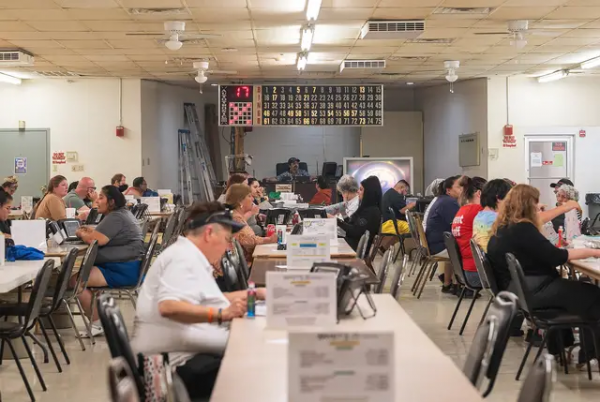
It was Lorraine’s idea. She proposed it to Rick Mitchell, the VFW hall’s commander in February, who then brought it to his members for a vote. It was unanimous.
“They’re a human being just like I’m a human being is the way I see it,” said Mitchell, a lifelong conservative from Kermit who lives in Odessa. “It doesn’t affect me one bit.”
Samantha Washington has been playing bingo at the hall for 15 years. The 49-year-old introduced her daughters, Elisha and Mesha, to the tradition. Bingo nights are a family getaway, she said. That the proceeds from Monday night help fund the Pride Center doesn’t bother her one bit, she said, so long as there is bingo.
“I don’t mind supporting them,” Washington said. “It’s people’s rights.”
The proceeds from bingo night don’t cover the expenses of running the center, but it helps, the Wilsons said. The couple hopes they will someday earn enough from that and other grants to expand their services and reach.
After Harris’ death, they said, their services are crucial to the community.
“We have to be able to give what we have now,” Clint said. “We have to rally and still continue what we have now. The main question that Bryan and I had was, how could this happen on our watch? It forces us to see how we can improve our reach.”
******************************************************************************************
/https://static.texastribune.org/media/profiles/Carlos_Nogueras_Ramos_TT_crop_01.jpg)
Carlos Nogueras Ramos is a regional reporter based in Odessa. Carlos joined The Texas Tribune in 2023 in partnership with Report for America. Carlos tells the stories of Texas from the vast energy-rich Permian Basin region. Before the Tribune, Carlos spent time in Philadelphia writing about local politics, including the city’s 100th mayoral election. A Spanish speaker, Carlos was one of the few Latino reporters on the campaign trail, covering the most expensive primary election to date in Philly. He is a proud Puerto Rico native, born and raised in Cayey. He studied at Berklee College of Music in Boston and the University of Puerto Rico.
******************************************************************************************
The preceding article was previously published by The Texas Tribune and is republished with permission.
We’ve got big things in store for you at The Texas Tribune Festival, happening Sept. 5–7 in downtown Austin. Join us for three days of big, bold conversations about politics, public policy and the day’s news.
Texans need truth. Help us report it.
Independent Texas reporting needs your support. The Texas Tribune delivers fact-based journalism for Texans, by Texans — and our community of members, the readers who donate, make our work possible. Help us bring you and millions of others in-depth news and information. Will you support our nonprofit newsroom with a donation of any amount?
Donate Here (Link)
-
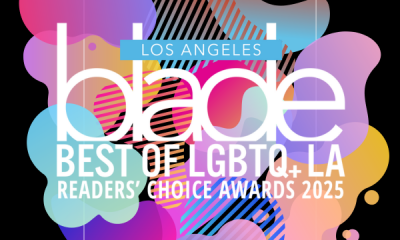
 Arts & Entertainment3 days ago
Arts & Entertainment3 days ago2025 Best of LGBTQ LA Readers’ Choice Award Nominations
-

 Local3 days ago
Local3 days ago‘Think of those who have not been seen,’ Cynthia Erivo’s powerful message at GLAAD Awards
-

 Opinions3 days ago
Opinions3 days agoGay bar in California bans MAGA gear — but no other political expression — from its premises
-

 Features3 days ago
Features3 days agoTristan Schukraft speaks on keeping queer spaces thriving
-
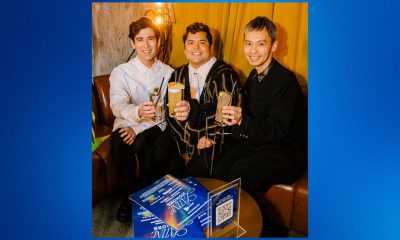
 California2 days ago
California2 days agoGLAAD’s Latine Honors celebrates culture and identity with packed house
-

 California1 day ago
California1 day agoTwo anti-trans bills fail to advance in California
-
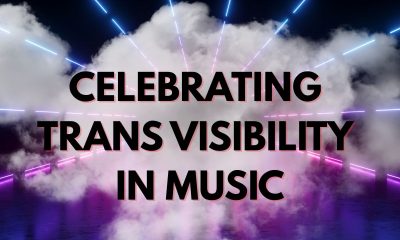
 Arts & Entertainment3 days ago
Arts & Entertainment3 days agoTrans Day of Visibility: Let us put you on 5 Latinx musicians you should be listening to right now
-
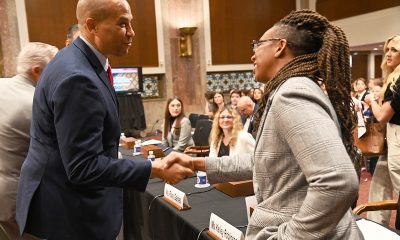
 opinions9 hours ago
opinions9 hours agoCory Booker’s missed moral moment
-

 Movies1 day ago
Movies1 day agoSexy small town secrets surface in twisty French ‘Misericordia’
-
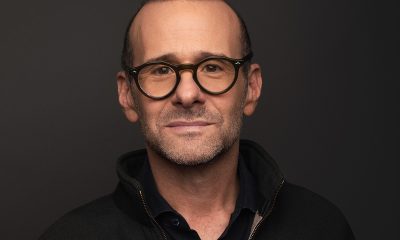
 a&e features8 hours ago
a&e features8 hours agoCreator Max Mutchnick on inspirations for ‘Mid-Century Modern’



